#when i got attacked by their friend
Explore tagged Tumblr posts
Text
mmm throwaway conversation between Dan and Danny that popped into my head that I had to write out:
"You spent ten years being a one-man mass extinction event, then went back in time and fought me, and lost." Danny snarls, arms crossed and throat tight. His mouth pulls back to bare dagger-sharp teeth, and his eyes burn with the familiar thrum of ectoplasm heating up behind his eyes. "If I didn't believe you were half of Vlad before, I do now."
His other self -- and really, can he even call him that? He's half of Vlad too. Two halves severed from each other and welded together to make a new whole, -- snaps his head over to him. Wild-eyed and furious, he looks unlike the man Danny fought before, the one unruffled and untouched, unbothered by the world around him. It's familiar, but not like the way a reflection is.
"What's that supposed to mean." The Other hisses, matching Danny's scowl one-for-one with fangs much bigger and sharper than his.
But there's a reason lions fear hyenas. Danny matches the rumble in The Other's chest with one of his own, and shoves his face close to his. "I don't lose."
#danny fenton#danny phantom#dp prompt#danny phantom prompt#dan phantom#dark danny#not meant for any particular au i just had the idea of danny going 'wow you can tell you're half of vlad' to dan and when questioned abt it#he says; 'if you were REALLY only me you wouldn't have lost' which is fucking BASED as hell. and also technically true#thought process for danny here was 'hates dan's fucking GUTS bc he tried to kill his family and friends without remorse and would actively#rip out his throat without a moment's notice.' some fr 'im going to beat you to death with my bare hands!' vibes rn.#not totally in character for danny but also i was thinking that it got to this point bc dan was goading danny about 'being his future self'#when that's not technically true. he's half of vlad too he just has danny's face and powers. and he pissed off danny enough that he#retaliated. just not in the way dan expected. dan was expecting a physical attack not a verbal one.#danny called him a loser in more ways than one.#also the reason danny never calls him 'dan' in this is because i was thinking that danny doesn't actually *have* a name to call him. bc he'#certainly not danny. but he's not vlad either. he's someone else entirely. so 'The Other' it is.#danny fenton is not the ghost king#<- down here because while its still MY DP post its not DPXDC so it doesnt need to be front and center for people to see it.
854 notes
·
View notes
Text

played lethal company w the touhou models mod. it truly enhanced the experience
#touhou#i wonder where they got the models from they are really good#they do a scary thing where their eyes glow in the dark though#also we kept getting attacked by freaking doppelgangers and it was extra scary when it was a glowy eyed reisen in the dark#i played as flandre :)#my friend playing clownpiece also had a mod that put uni the cat on their head
483 notes
·
View notes
Text
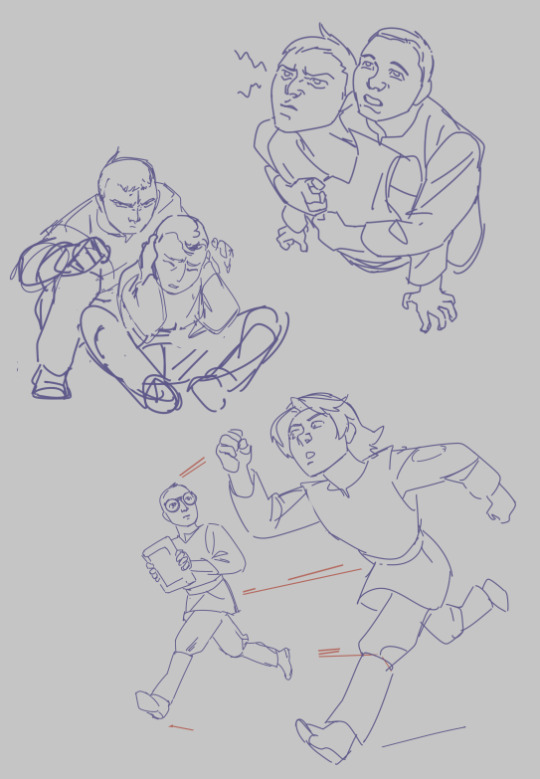
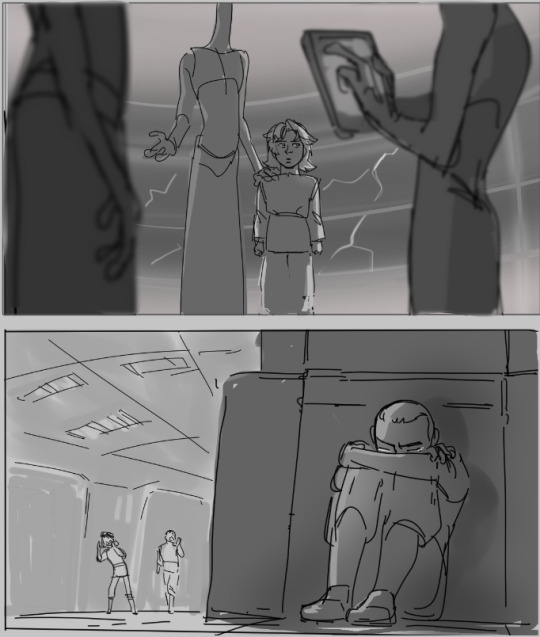
TBB cadets ideas
#star wars#star wars the bad batch#the bad batch fanart#tbb fanart#star wars fanart#more to come maybe idk#Anyway#idk how fanartists manage to get their chara right I couldn't#hope they're at least recognizable#I'm too tired to clean them anyway#BTW I got my broken tooth fixed#I mean ...more like vital prognosis engaged#Dentist scolded me#deserved#It was really the meme “you live like this??” but with my mouth#anyway at least they'll have a fun story to talk about at party I guess#oh last time I got a PATIENT#WTF#like first she hadn't seen anyone since YEARS#then she went livid when I told her I had to operate#she was probably on the verge of a panic attack I had to reassure her like EVERY five minutes like a child#can you fill my glass again thanks#I mean I've got several friends working in medical I know how it is ^^;#Now my whole jaw aches#and I'm hungry ofc#ANYWAY#if you excuse me#I'm gonna roll myself in a burrito and cry
549 notes
·
View notes
Text



BONUS ART!!


the luau scene 🥥🌴🌺🍍
#dreamworks trolls#trolls band togeather#branch trolls#poppy trolls#viva trolls#john dory trolls#my art#i wanted to do art for the full scene but i just dont have the time or energy :(#anyway to answer a bunch of peoples questions! yes john and viva work at the same restaurant#and both of their baby sibs also happen to be best friends#even after branch lost his colors poppy has stuck by his side#viva and clay were also childhood best friends but when he moved away she got closer to jd#“ really poppy? in front of my chocolate muffin don't be gross ” :P#“ oh don't be a baby branch ”#“ it's not gross if its true! i read her diary ”#!!! “ im not a baby!! im older than you! ”#“ pfft yea by like 3 months lol ”#they continue to bicker like that until total ellipse of the heart plays on the speakers#which then triggers branch into having a panic attack and JD loses his job :(#lilo and stitch au#thinking of renaming it lost and found au#baby groppy#implied future vivadory#fanart#doodle#sketch#trolls#screenshot redraw#trolls au#lilo and stitch
387 notes
·
View notes
Text
Birds of a Feather previous / next tw: anxiety attack

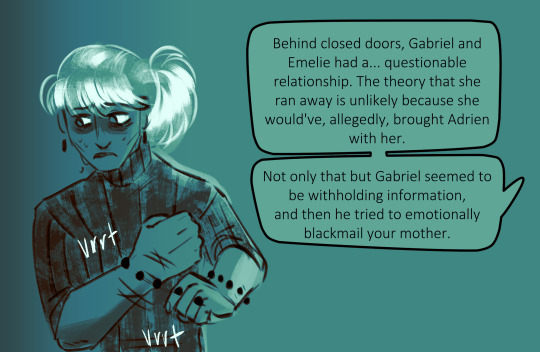

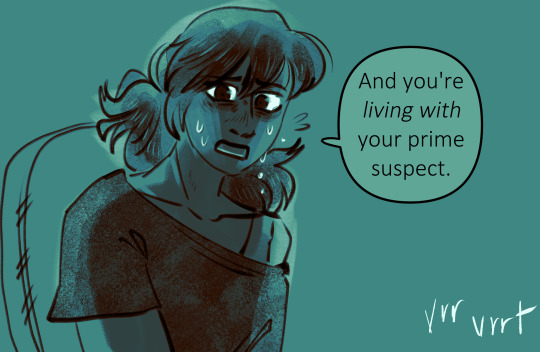
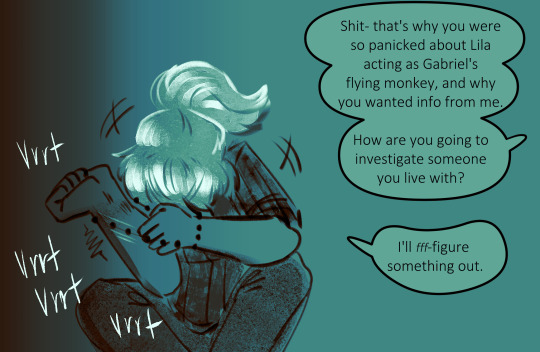
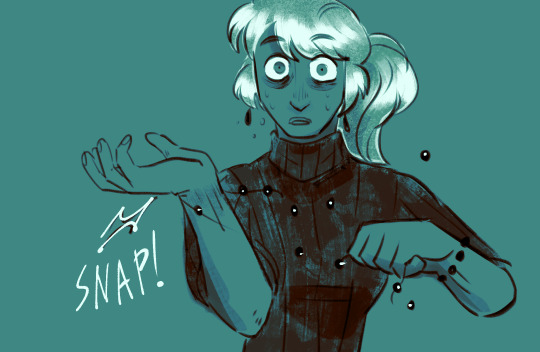

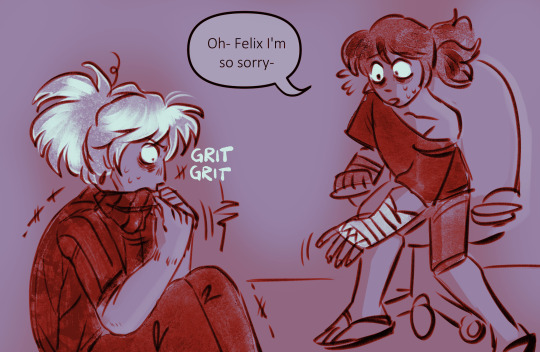

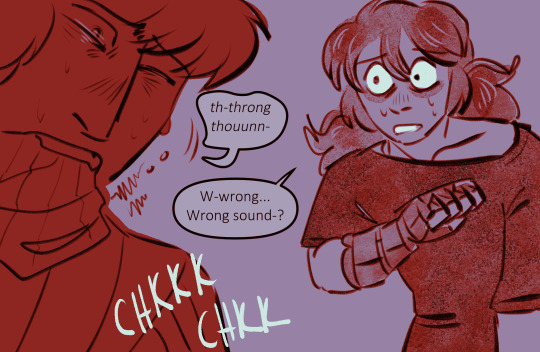


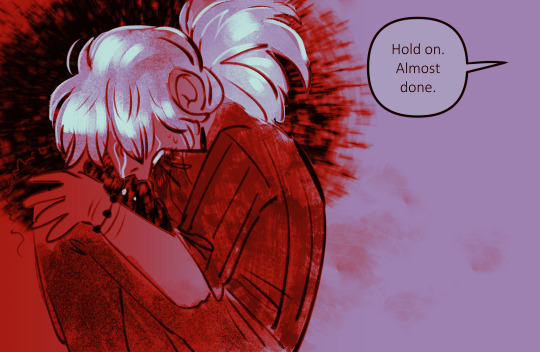
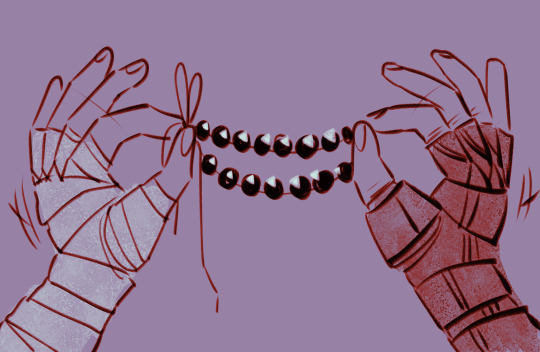
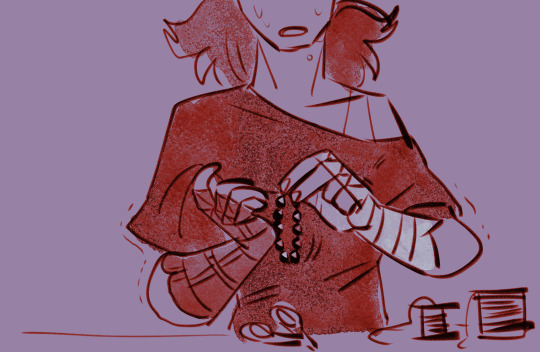
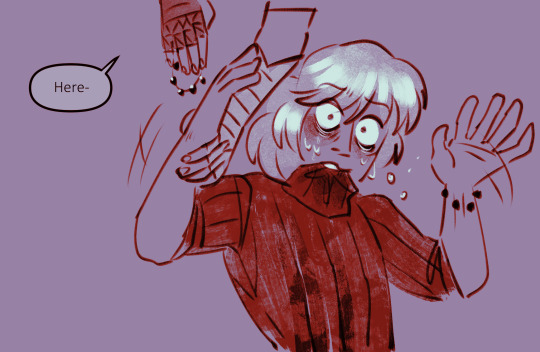
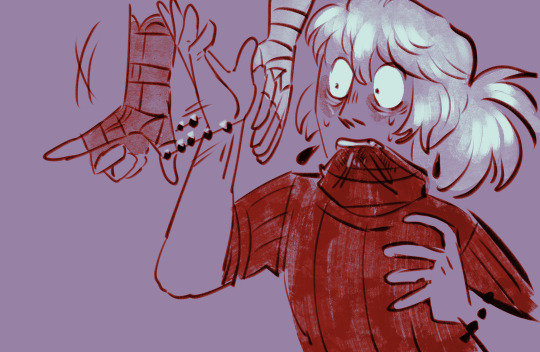
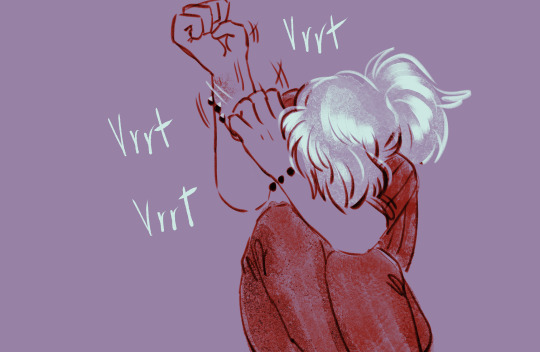

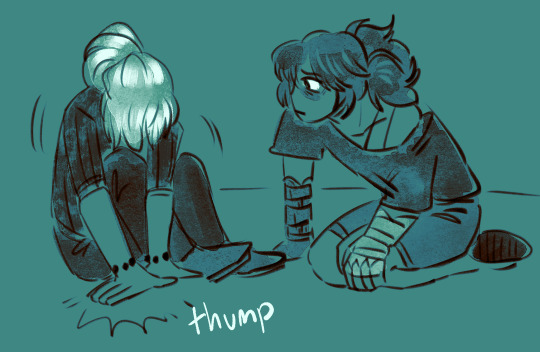

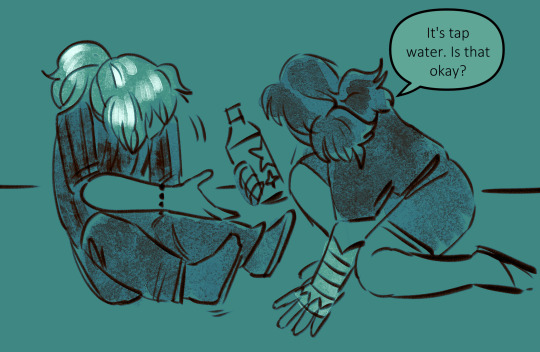

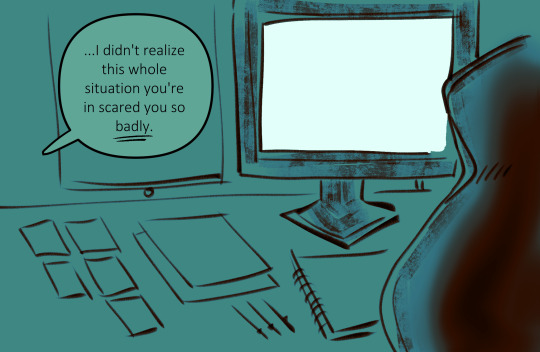
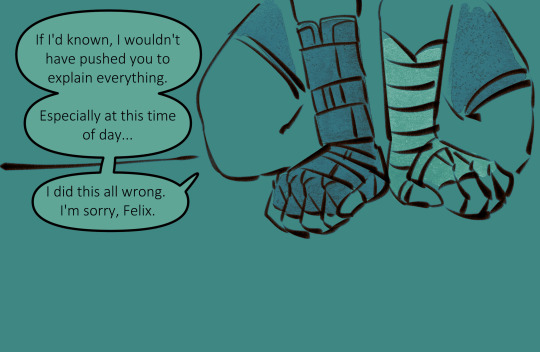





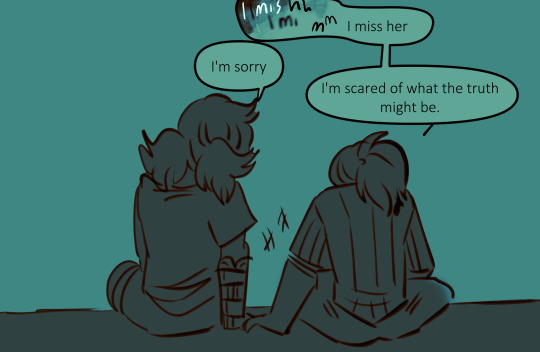

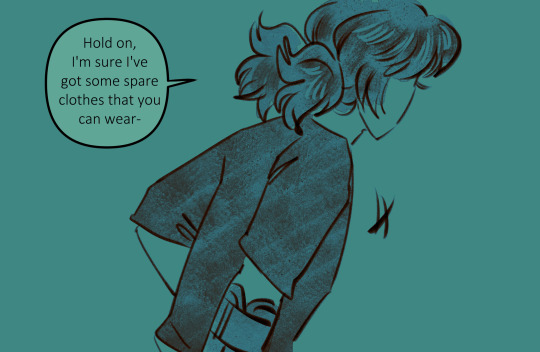
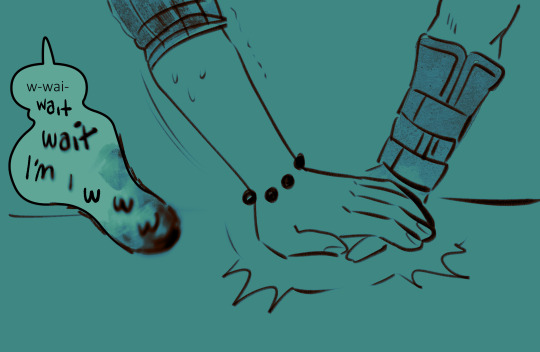

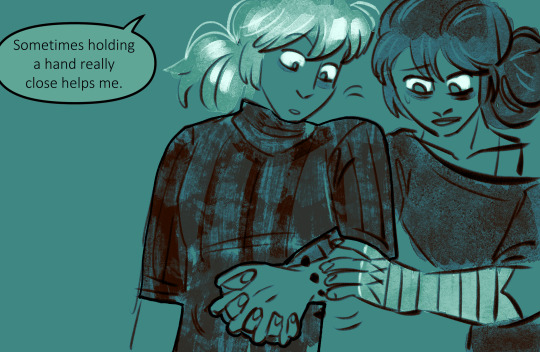

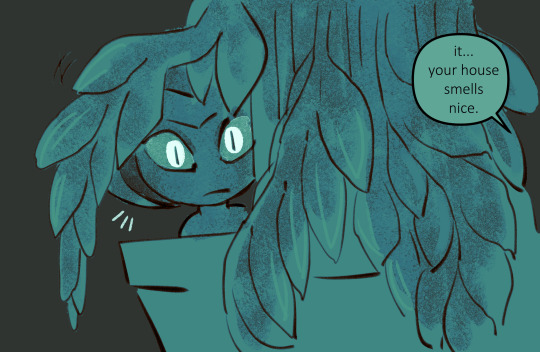
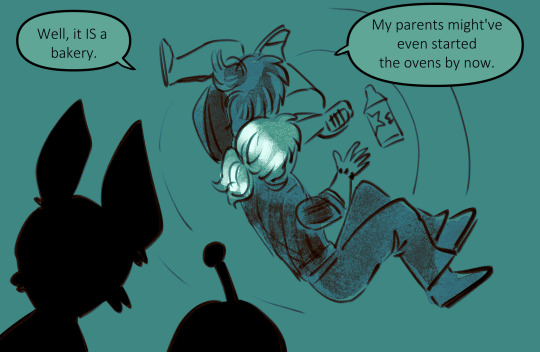
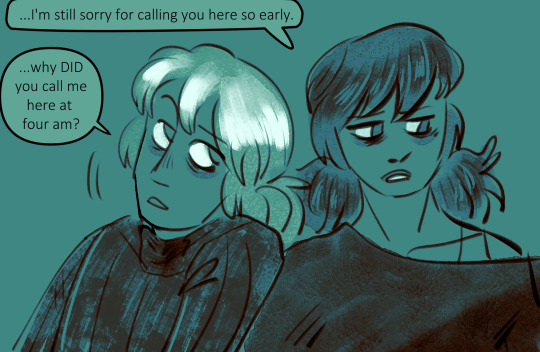

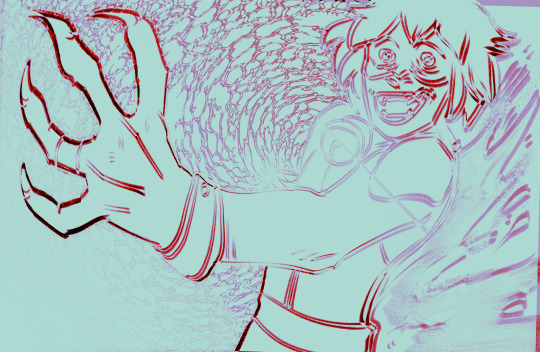

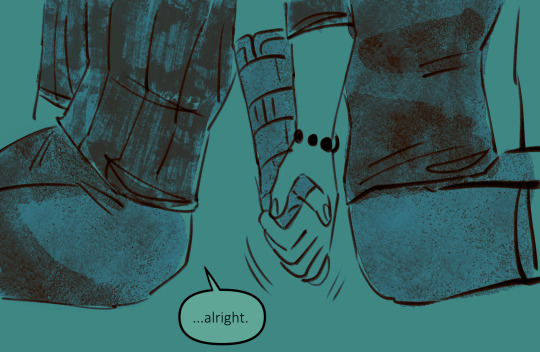
#as a note that bracelet isnt like a magical ooo anxiety attack cureall#it was the bracelet breaking#their usual stim that helps the calm down and focus#right after talking abt losing emelie#that triggered the feeling of intense loss again#so being able to futz with it again helped them calm down#i mean. they didnt get their aunt back#but they at least got their bracelet back#OH ALSO when they get rlly +++vibes they grit their teeth#which can damage their teeth so they try to chew on the collars of their shirts instead#we've only seen it once before when nino mentioned gabe#also their i tried to add a lil shine to explain but#the bracelet they wear on their right hand has crystal beads#the other has plastic#so it doesnt make the right sound or feel right#anway to wrap this up#nothing like the nostalgia of helping a friend recover from a breakdown after u just had on lmao#feralnette au#my art#felix culpa#marinette dupain cheng#birds of a feather#tw anxiety attack#this update took a bit bc i dipped into my own fun attacks for ref
3K notes
·
View notes
Text
I just realized some people are confused about events in the alluded to past in Mouthwashing, particularly about how long the crew has been working together.
The only person who is truly new is Daisuke and it’s why his dynamic with the crew and role in the story is very unique and somewhat distant. Curly didn’t just get Jimmy this job on the Tulpar, he got him the job with the Pony Express. He’s been his copilot for probably a couple of years but still not as long as they’ve been friends. None of them are new with the freight industry, Anya and Swansea especially have been doing this for years, together.
Jimmy is the newest on the regular crew, maybe just a few assignments, but it’s not his first time working with them. I think it’s just something important because this isn’t just one bad mistake that snowballed with giving Jimmy the job. None of them thought Jimmy would do anything, no matter how off-put by him they could’ve been, since he hadn’t done a thing since being there. Generally unpleasantness isn’t a crime and he’d be aware of that.
It was a festering thing and a sort of forced trust they had to give him that he knowingly took advantage of. He was the black sheep and still a wolf under the wool. He expected when he lashed out, that he had been there long enough for it to be looked over completely. Got too comfortable in the space he inserted into and did a lot of damage with his claws when he felt he was going to get shaken out.
#I think acting like if Curly just didn’t give Jim the job this wouldn’t have happened is underplaying that they’ve all been working for PE#for a bit and that Jimmy got comfortable enough to do something horrible like#a lot of factors made the trip being out the worse parts of them but Jimmy was slowly letting his worse parts show and I think people assume#that this was one a few mission he went on with Curly and that he advocated for him completely when it was more likely#he pulled some strings so Jimmy could work right under him and stay out of trouble with a decent job and it back fired cause Jimmy is just#not a good person like I see people acting like his breakdown and choice to crash the ship was because this was probably one of the last#chances to fix his life and he couldn’t admit he fucked up soemthing literally handed to him so badly and cruelly#I think people forget that predators like Jimmy rarely do anything the first day. or week or month or year#they ingrain themselves into the schedule and dynamic and build a sort of stability that make it harder to knock them down or push back#he has Curly’s trust as the co pilot and as a friend#Swansea doesn’t like him but doesn’t trust him and Anya is just wary initially#he doesnt even attack her at the start of the trip it’s implied it happens after the psyche evals and when she confides in Curly how#patronizing he is to her and her position. he’s retaliating against a perceived slight to his stability to him it was pure act of power and#anger because he’s at his core an avoidant bully who can’t take responsibility#mouthwashing#mouthwashing game#jimmy mouthwashing#I didn’t want this to be a Jimmy post but it is#more so about how abusers like Jimmy work but I digress cause most of it’s in the comments
227 notes
·
View notes
Text
@cokoweee
Ya’ll ever have a dream so lifelike it feels aggressively real until one thing goes a little too wrong and then you start to realize that maybe you’re in a dream but it’s also too real to convince yourself it’s not real that you can’t wake yourself up?
TW: panic attack, I say gun, uhhh blood ig? Bishop says a kinda weird thing but that's just him bein him
can I say blood? last time I did it marked me as mature...
-
Her heart thumped against her chest, lactic acid building in her legs as she ran. She tapped furiously at her phone, fingers slipping over the screen as she tried to deploy Sheldon.
Donnie says “no no no” chimed a pixilated picture of Othello, his finger waving back and forth.
“What the-” She slammed against a wall, her shoulder crunching against the brick.
His stupid programming on the poor thing to keep Sheldon at his house. Maybe she could override it?
No, not enough time. She was just going to have to run and hope for the best.
Her shoulder screamed in protest as she climbed the ladder in the alley. Scrambling over the side of the building to catch her breath, she tapped at the screen again.
There had to be something she could do to foil his programming. She wiped at her nose, the cold still not quite gone even after days of bed rest. Bullets flew over the edge of the building, seemingly locking on to her body heat. Throwing herself at the ledge at the last second to force the bullets to crash into the wall she coughed violently, phlegm coating her throat.
Stupid sickness.
Stupid Othello leaving her with the stupid rabbit farmer.
She pushed herself off the ground, arms struggling under the weight of herself. It was as if every muscle in her body was on fire, each fiber screaming at her to stop. She gulped raising her head over the ledge. Agent Bishop was standing on the adjacent rooftop, his face curled into a sneer, eyes unblinking despite the sun in his eyes.
He waved at her, fingers waggling in the air as he pulled a small gun from his pocket. Aiming it directly at her chest he grinned, his eyes flickering with something distinctly unhuman.
She stumbled backward, her feet skidding over the concrete as he seemed to lock onto her. Loose rock dug into her knees as she clambered over the rooftop.
Away.
All she needed to do was get away.
She placed a hand over her stomach, feeling the raised bump of the scar, as she moved.
This was…
This was wrong?
It didn’t happen this way.
No. She didn’t need to get away, she needed to get out.
The bullet ripped into her skin, tearing away at muscle, and shattering the bone in her rib.
She screamed, blood pouring from the gaping hole in her chest, as Bishop moved closer. He walked to her side, footsteps clanking against the concrete.
Clawing at the ground she dragged her body along the roof, rocks digging under her nails. Bishop laughed, his foot trampling her hand, digging it into the ground. She gasped, breathing shallowly as she fought to get loose.
He grabbed her hair, wrapping it between his fingers and tightening his grip as he pulled her from the floor.
“Oh, this is wonderful.” He smiled, voice dripping with venom. “Such a pretty little thing I caught this evening. I’ve been dying to chat with you.” He pulled her hair up, forcing her to rise. “I wonder if she’ll do any tricks?”
She spat in his face, her ears filled with an all-consuming ringing.
Away.
She needed to get away.
It didn’t matter how. She needed to get away.
He said something else, flaunting some sort of mechanism he had hidden in his shirt. She tried to focus on his words, but her breathing was too shallow, her limbs too shaky, the ringing too loud for her to hear a word.
She clamped a hand over her chest, a sorry attempt to staunch the flow of blood from the gaping hole in her body. Cursing softly she watched as the red seeped into a slithering pink fleshy mass.
She stifled a scream as the pink turned an orange maroon, her own blood fueling some sort of monster.
“Shhhhhhh.” Bishop whispered against her ear, “It’ll be done soon. Just one quick slash and you’ll be out of my hair for good.”
The mass jumped forward, faster than she could comprehend, her body spasming in pain as she scrambled back.
Was this the Krang she’d heard so much about after she’d left the jail? Weren’t they supposed to be mindless or something?
It lunged forward again, tentacles lashing toward her face. Bishop shook her in front of him, like a toy for a dog.
“Kendra?”
She screamed as he tightened his grip on her, shaking her around like a bag of flour. The world around her turned hazy, her vision blurring in and out.
She wasn’t going to go out without a fight.
Throwing her head back she jammed her skull into his chin, breaking the grip he had on her hair.
She clawed at the ground, a strange silky feeling coating her fingers. Pushing away the softness of what was sure to be Krang, she kicked at the mass as it wiggled unnaturally.
“KENDRA!” A familiar voice shouted at her, a gentle three-fingered nubby touch against her arm.
Her eyes flew open, arms flailing to the sides to swat at what was left of the Krang matter, as hands held her back. She gasped, her chest heaving as a sinking feeling hit her gut. Dread splashed over her head like a wave, drowning her, leaving nothing but fear.
Eyes widening she looked next to her for Tello, horrified as darkness encroached on her vision, leaving her staring through a pin hole. Nausea rolled through her stomach as she gasped for air, her chest shuddering to keep up with her breathing.
It hurt. It hurt so bad.
“Hey, hey, hey.” He whispered, hand placed against her back. “It’s ok you’re home. You’re with me.”
She jerked backward. He was loud. So so loud. Even with the ringing in her ears, he was too loud.
Breaths were punched from her lungs faster than she could finish taking them in. Tears streamed down her face as her eyes blew wide. Her chest tightened, lungs twisting as she shook.
She’s dying. She has to be dying. There’s no other explanation.
Dead in her room from a nightmare-induced heart attack,
Her eyes flickered back and forth over the room, not focusing on anything, just wildly scanning for danger she knew wasn’t there. Willing her arm to move, she let out a chocked warble.
The room seemed to melt around her. Things blurred together, a fuzzy abstract painting of almost-real-life. Sweat beaded on her forehead as she tightened her muscles.
Her whole body shook as she tried to take steadying breaths.
“Did you know softshell turtles only have half a plastron?”
She was in the middle of dying.
She most definitely did not need turtle facts right now.
“Technically a full one, but it’s covered by skin, rendering it effectively useless for plastron purposes.” He shrugs. “Same deal as the shell.”
She looked at him, confusion breaking through the panic.
“Makes us really flexible though. Wanna see?”
He got off the bed, walked to the middle of the room, and bent backward. He smiled upside down at her from the floor and smoothly brought himself back up.
“Pretty neat huh?” He waggled his eyebrows. “Bet no other turtle you meet could do that.”
Amusement rippled through her as she watched him demonstrate his stretches and various yoga poses.
“I’ve never met another turtle like you.” She breathed, some of the panic melting away.
“Precisely! No one can do it like me!” He said, pointing his finger at her triumphantly before his face softened. “ We starting to feel a bit better?”
She brought her thumb and pointer finger close together. A little
He nodded. “Am I good to come back up or do you need some space?”
She patted the bed next to her, inviting him closer. She waited until he was seated comfortably before slumping against his shoulder, exhausted.
He shifted slightly, reaching for his phone with one hand, the other wrapped around her. He let them sit for a moment, reminding her to breathe every few seconds before Sheldon zipped into the room.
He whispered something to Othello before zooming out of the room. She watched passively as it happened, her body still not quite connected to her soul.
Sheldon returned moments later, a bag of ice, a bottle of water, a cookie, and tub of lavender lotion in his little propeller arms.
Othello took them from him, patted his head, and shooed him away. Taking one of the ice cubes he flattened out her hand and placed it in her palm.
She jerked slightly at the sensation of cold in her hand, surprised when he placed another in her palm.
“Focus on the melting.” He said, voice low and gentle.
The ice filled the lines of her hand and dripped over the sides and down her arm. She shivered as the water pooled in her hand. Othello grabbed the cookie from the pile he had created and broke off half to give to her.
“Thanks?”
He watched her carefully. “What does it taste like?”
“A cookie?” She said through a mouthful, her hands still full of TV static.
“I need details.” He pressed.
She paused, taking a moment to consider the flavors in her mouth. “Vanilla, chocolate chips.” She took another bite. “ Like I left it in the oven a minute or two too long and overcooked them just slightly.”
She’d have to make another batch, this time keeping an eye on the time.
He pressed an uncapped water bottle into her hand. “Drink.”
She pressed the bottle to her lips, feeling the way the cold blossomed against her skin as she held it there. Quietly observing the way she could feel it go down her throat and into her stomach.
“Are we feeling more alive?”
She nodded, running her hand along her thigh to feel the fabric of her pajama pants as she pressed her head against his side.
“Good.” He murmured, sleep creeping into his voice. “You had a panic attack I’m pretty sure.”
“...Sorry it was for something stupid.”
“I get worked up over stupid stuff too.” He mumbled, eyes half closed.
“Your stuff isn’t stupid.” She countered.
“Then neither is yours.”
She stopped, lifting her head to look up at him.
He grabbed her hand, flexing the fingers for her. “You feel ok?”
“I don’t know.” She answered honestly.
He nodded and guided her to a lying position. “Tell me five of your favorite things.”
She paused, looking around the room. “Hmmmmm. You.”
“Thank you.”
“Mhm. Uhhh, lavender. The color purple. Satin jackets. Baking. Messing around in the lab. Oh, I guess that’s more than five.”
He tapped her shoulders rhythmically, “You can keep going if you need to.”
She took in a deep breath. “I think I’m ok now.”
“Positive?”
Nodding she pulled the blankets over herself. What she really needed was rest. She was so exhausted from the whole ordeal that the idea of doing anything else felt impossible.
He got off the bed again, searching beneath the bedframe for something before he pulled a large purple blanket from under the bed. She blinked in surprise as he placed it over her, a weight holding her down to the bed.
“I should’ve mentioned it was weighted.”
She pulled her hand out to give a quick thumbs up as he climbed back into bed. She shifted to hold out her arm for a hug. He smiled and pulled her close, wrapping his arm around her waist.
“You smell like you’ve been using my soap.” She grumbled against his plastron.
He shrugged. “ I like the way you smell.”
Rolling her eyes she tugged the blanket higher over her shoulders smiling as soft chirping filled the room, the sound he always made right as he fell asleep.
“Good night Tello.” She whispered.
His plastron vibrated as he churred back, gently running circles through her hair.
She was home. And she was safe.
~
squad don't write stuff at four AM I'm pretty sure this only makes sense to me at this point. Anyway I was listening to my pretty princess playlist while writing this 💁♀️
the reason why this was written is in the tags btw
#Me and my friend were hanging out and she got all excited when I told her I was minoring in creative writing#she asked for me to read me some of my stuff and I agreed LIKE AN IDOIT#well i open my docs and low and behold it's what I posted yesterday#mind you that doc is titled ugly sewer man and his pretty wife#i scroll before she can see the title but at this point I have to read this one#its too late for me to exit the doc without me being suspicious#I read it and she's all like “Well butter my backside and call me a biscuit I forgot you wrote but you do a pretty dang good job!”#I'm just sweating bullets coz I just read her my fanfic of Donatello the ninja turtle and Kendra the dragon chick#she'll never know and I'll never tell her that she was read kendratello fanfic with the names and some of the words replaced#its worth it to say that this isn't the first time that this has happened with her#last time it was the freaking really long one with Leo dying dead and Don also trying to die dead#i went home and cooked myself some pasta to recover because wtf was that#and I was so upset by the situation that instead of sleeping I wrote more kendratello fanfic?#pee pee poo poo#caca dodo even#FOUR AM BABY AND IM STILL HEREEEEEE#Ya'll also got some free stuff to use to help a hommie out if they ever start having a panic attack#tapping method will work on yourself as well if you start feeling freaked out or not in your body.#just cross your arms over your torso and put your left hand on your right shoulder and vice versa tapping your shoulders one at a time#im sleepin now#gn yall
45 notes
·
View notes
Note
Honestly, Dottore with reader as playable chars is such a funny concept. You know people who build supports chars as dps, like Barbara, Qiqi, me with Candace, all that stuff. Dottore insulting the absolute idiocy of the player, while wearing something like under leveled noblesse w/ lvl 1 fav. greatsword, while his lover gets the perfect artifacts, weapon, 3 crowns etc etc, with the motivation of "their autoattacks are so cute, I want to see them more often >:"
-🥀
OMG YESSS... this actually made me realize duo playable Reader and Dottore would be a lot of investment... two separate weapons, level-up materials, artifact sets, talents. You would be spending a LOT of resin on these two and probably end up neglecting one of them if you don't plan accordingly. In this case, Dottore. The poor Harbinger is hitting double-digit damage (giving Dottore The Bell weapon, just to be even more evil) while Reader, despite being the support character, is somehow hitting in the six-digit area for showcases. Needless to say, he's very much not amused at the player's antics, more because now he has to deal with Reader flaunting how much stronger they are compared to him. Unfortunately, it seems like he's going to be benched for a while despite being out on the field all the time...
#smooches talks#🥀 anon#dottore love notes <3#playable reader <3#even funnier if the player actually despises dottore but got him bc reader is cute 😭🙏#no but fr they always giving the prettiest auto attacks to supports WHEN U DONT NEED TO NORMAL ATK WITH THEM!!!#my friend also built a dps qiqi once so i understand u#(me who is candace-less </3)#IM STILL SO SAD I DONT HAVE HER#i keep getting cons of characters i already have c6... grrr
108 notes
·
View notes
Text
So there was a post a while back about Ben Solo always being told "don't do (x), that's how uncle luke lost his hand" when he was a kid - and I raise you: Elrond and Elros being told "don't do (x), that's how Maedhros lost his hand"??
Like, at Amon Ereb when the twins were newly acquired and refusing to eat their vegetables and Maglor is Mag-mothering them until Erestor, feral half-sane clinically depressed anarchist Avari hostage/patient/infiltrator and Certified Little Shit, hits em with:
"I would listen to the Lord Maglor, winyamor, he well knows the dangers that come to young elflings who don't eat enough vegetables - after all, that's how his brother lost his hand."
Elrond looks conflicted. Elros squints suspiciously. "Truly?"
Erestor, practically comatose since the massacre but ultimately saved from Fading by the biological compulsion to fuck with you, lays a hand over his heart. "I would never lie about such a thing! Just what do you take me for? This is a true tale and a grave warning - the Lord Maedhros' hand was tragically lost in the days of his youth, whilst he was still growing as you are. He refused to eat his vegetables and so, cruelly deprived of the strength it needed to grow strong, his body started to fall apart! First his fingers, then his thumb, and then his palm and wrist - all turned blue and dropped off!"
"No!" Elrond gasps. Elros looks both terrified and impressed. Maglor's face is scrunched up into something that the twins probably interpret as pained - at reminder of the horrors of limbs falling off! - but is actually just him busting a rib trying not to laugh.
"Yes!" Erestor cries with relish. "And it never grew back. All because he didn't eat his vegetables. Isn't that right, Lord Maedhros?"
Maedhros, a looming terror at the head of the table, scarred and solemn and impenetrable as his fortresses, narrows his eyes consideringly at the unfolding shenanigans and the rascal behind it. His conclusion? Fuck it. He gives a slow, solemn nod. Completely deadpan and exaggeratedly formal, because it may have been centuries since he last had his brothers smothering laughter at political dinners but the Finwëan sense of humour, once caught, is not an ailment easily cured.
Maglor conceals his wheezes behind his goblet as Erestor nods sagely to the wide-eyed twins, who suddenly seem a sight more interested in their vegetables.
#it helps that maedhros also has a metric fuck ton of scars so he can make up so much shit#know how i lost my eye? didnt go to bed on time and it shrivelled up#why do i have to wear a shoulder brace sometimes? didn't practice my letters and the bones all fell apart#where'd my fingernails go? didnt wash my hands before eating and they ran away#why is my back all stripy with criss-cross lines? didnt use my cutlery and they attacked me#why are some of my teeth metal? cause i didnt clean em properly for two minutes with mint ointment and i accidentally ate them in my sleep#whys there grey bits in my hair? didnt bathe after running around in the woods and the cobwebs got stuck and never came out#what happened to my ears? ducked underneath a horse and it spooked and bit them off so never ever do that again elros its very dangerous ok#i dont care your ears are smaller because youre peredhel elros the horse will get you#whys my hair so short? didnt comb it so it was stolen by orcs now hand me the brush and get over here elrond your head's a birdnest#for all that the kid's questions sometimes make maedhros a lil uncomfortable its actually really healing for him#sure sauron whipped him until his spine broke but now he uses those marks to get his kids to eat with cutlery like civilised people#and he cut his hair in a depressive spiral after fingon died but his kids think it was so tangled the orcs stole it to make scruffy orc wig#and his shoulders fucked from hanging on thangondrim for decades but if you kids dont sit down and do your lessons then so help me -#his beloved fingon always kissed his scars when he was allowed but it was witty irreverent half insane erestor who helped him laugh at them#i kind of ship it in a 'secret third thing' kinda way u feel me? not sex not friends but they bring a lot out of eachother its weird#erestor#maedhros#kidnap fam#elrond and elros#maglor#there is a fic that goes with this who wants it
30 notes
·
View notes
Note
Me again. Your (amazing) post on Camille and Robespierre got me thinking about the ins and outs of the Vieux Cordelier story. There are so many interesting details there , and moments where it could almost have gone a different way. I wondered what your assessment is of Camille’s mindset over this period? Obviously he must have been aware that he was taking a massive risk, but what was the ratio of kamikaze to (possibly deluded) belief he could actually change Robespierre’s mind and thus policy?
If the latter, I feel like that in itself is evidence that they were quite personally close, given “clemency” obviously not the way Robespierre was naturally leaning politically ?
Secondly, to what extent would you say Camille was attempting to back down in numbers 6 and 7, and could it have saved him if he had been willing to so that more fully, or was it just too late at that point?
Finally, somewhat separately, what do we actually know about Danton’s role in the indulgents campaign , and to what extent was Camille his “mouthpiece” ? It often gets phrased that way , but Danton actually comes across as marginal to the stand-off in the textual evidence from Vieux Cordelier itself and the debates in the jacobins around this time. Camille certainly seems to be the main one on the front line. What evidence do we have that Danton wanted him to go through with the riskier numbers of Vieux Cordelier?
Sorry, three to four very wordy questions there…and I’m aware you can’t answer them without a *lot* of guesswork . The whole tale is so fascinating.
In a letter to his father dated August 1 1793 (the last one conserved written by him as a free man) Camille expresses regret over a revolution that has not turned out the way he wanted it, as well as a wish to spend more time with his family:
Where is the asylum, the underground where I could hide from all eyes with my wife, my child and my books? I cannot help but constantly think about the fact that these men who are killed by the thousands have children, also have their fathers who accuse us of their grief, which it would have been so easy to spare them of. At least I have no reason to reproach myself for any of these wars which I have always opposed, nor for this multitude of evils, the fruit of ignorance and blind ambition sitting together at the helm. Farewell. I embrace you. Take care of your health, so that I can hold you against my chest if I am to survive this revolution; although there are times when I am tempted to cry out like Lord Falkland, and go and get myself killed in the Vendée or at the borders to free myself from the spectacle of so many evils and a revolution that to me does not seem to have brought common sense into the council of those who govern the republic and in which I see little else than ambition in place of ambition and greed in place of greed. It is true that freedom of the press is a great remedy whose benefit we owe to the revolution, and there is this advantage in the new regime over knaves, that we can have hanged, and over the ignorant and the intriguers, who we can deliver to ridicule. The state of things, such as it is, is incomparably better than four years ago, because there is hope of improving it, a hope which does not exist under the despotism of which the slaves are condemned like spem bon habent, but it is to the prize of so much bloodshed, that I feel such a sacrifice from the nation’s men should offer it a bigger happiness.
On December 14 1793, he also admitted that, on October 30, the day the Girondins were condemned to death, he had exclaimed: ”they die as republicans, but federalist republicans.” Camille’s accusers the same day did on the other hand declare that the correct quote had been ”they die as republicans, as Brutus,” and in his Les mysterès de la mère de Dieu dévoilès, released a few months after Camille’s death, Joachim Vilate described an even more dramatic reaction from his part:
This led to the account that I gave them of the particularities of the judgment of this case. I observed that I was sitting, with Camille Desmoulins, on the bench placed in front of the jury table. When these returned from deliberation, Camille comes forward to speak to Antonelle, who was one of the last to return. Surprised by the change in his face, he said to him, quite loudly: ”ah my god, I pity you, these are very terrible functions.” Then, hearing the juror's declaration, he suddenly threw himself into my arms, agitated, tormenting himself: ”ah my god, my god, it's me who kills them: my Brissot dévoilé [sic], ah my god, it’s that which kills them.” As the accused returned to hear their judgment, eyes turned towards them. The deepest silence reigned throughout the room, the public prosecutor announced the death penalty, the unfortunate Camille, defeated, losing the use of his senses, let out these words: ”I'm leaving, I'm leaving, I want to leave.” He couldn't exit. […] The late hour of the night, the torches were lit, the judges and the public were tired from a long session, it was midnight, everything gave this scene a dark, imposing and terrible character, nature was suffering in all its ailments. Camille Desmoulins felt worse.
In his 2018 biography, Hervé Leuwers also underlines how Camille throughout the fall of 1793 started to absence himself from both the Convention and the Jacobins, and when in rare instances did take to the floor it was with moderation in mind — on October 16 he and Philippeaux demanded some adjustment to a decree ordering the arrest of all foreigners belonging to countries currently at war with France at the Convention, and on November 26 he warned the Jacobins that "when a man is proscribed by public opinion, he is halfway to the guillotine." (Leuwers does however note a similar absence during the spring of the same year, AKA, the same period Camille was working on the fatal l’Histoire des Brissotins, so this is perhaps a weaker point). All these pieces could hint at the idea Camille’s mindset at the time was that of a a man who had grown disillusioned with the revolution and was willing to try to moderate it (and perhaps atone for some of the bloodshed he had himself contributed to causing?)
The first number of Le Vieux Cordelier was released on December 5, just two days after a jacobin session where Danton had opposed the idea of sending a group with a guillotine to Seine-Inférieure in order to deal with rebels fleeing the Vendée — ”The Constitution must be asleep, while the people are busy striking their enemies and terrifying them with their revolutionary operations: this is my thought, which will undoubtedly not be slandered; but I ask that we distrust those who want to take the people beyond the limits of the revolution, and who propose ultra-revolutionary measures.” Coupé d’Oise protests against this, arguing that the club must not listen to ”proposals tending to diminish the vigor of the revolutionary movement.” As a consequence, Danton defends his patriotism and asks that a commission be set up to look over his conduct, after which Robespierre stands up as well to take his defence — ”In political matters, I observed him: a difference of opinion between him and me made me observe him carefully, sometimes with anger; and, if he was not always of my opinion, would I conclude that he betrayed his homeland? No, I have seen him always serve it with zeal. Danton wants us to judge him. He's right, let me be judged too. Let them come forward, these men who are more patriotic than us! I bet they are noble, privileged people!”, ending by asking that everyone says what he sincerely thinks about Danton. Aside from Merlin de Thionville, who hails Danton as the saviour of the republic, no one says anything, and Momoro therefore concludes this means no one has anything to accuse Danton of. The discussion therefore ends with the latter embracing the president of the club amidst loud applause. Camille references the session in the number, describing it as the event that caused him to return to the journalistic pen:
Victory is with us because, amid the ruins of so many colossal civic reputations, Robespierre’s in unassailed; because he lent a hand to his competitor in patriotism, our perpetual President of the “Old Cordeliers,” our Horatius Cocles, who alone held the bridge against Lafayette and his four thousand Parisians besieging Marat, who now seemed overwhelmed by the foreign party. Already having gained stronger ground during the illness and absence of Danton, this party, domineering insolent in society, in the midst of the most sensitive places, the most compelling justification, in the tribunes, jeering, and in the middle of the meeting, shaking its head and smiling with pity, as in the speech of a man condemned by every vote. We have won, however, because after the crushing speeches of Robespierre, in which it seems that talent grows in pace with the dangers of the Republic, and the profound impression he has left in souls, it was impossible to venture to raise a voice against Danton without giving, so to speak, a public quittance of guineas of Pitt. […] I learned some things yesterday. I saw how many enemies we have. Their multitude tears me from the Hotel des Invalides and returns me to combat. I must write. I have to leave behind the slow pen of the history of the Revolution I was tracing by the fire side in order to again take up the rapid and breathless pen of the journalist and follow, at full gallop, the revolutionary torrent. A consulting deputy who no one has consulted since June 3, I leave my office and armchair, where I had all the time in the world to follow in detail our enemies’ new system, an overview of which Robespierre laid out to you and which his occupations at the Committee of Public Safety have prevented him, like me, from seizing in its entirety. I feel again what I said a year ago, how wrong I was to put aside the journalistic pen and grant intrigue the time to adulterate the opinions of the departments and corrupt that immense sea by means of a mass of journals, like many rivers that ceaselessly bringing poisoned water. We no longer have any journals that tell the truth, or at least the whole truth. I return to the arena with all of my well-known honesty and courage.
To say something about Camille’s mindset based off of this first number, it can in other words be concluded that he by this point is on the side of both Danton and Robespierre, wanting to aid them in a fight against ”a foreign party,” that he doesn’t specify much about, but that, through the jacobin session that he claims inspired him so much, can be deciphed as ”ultra-revolutionaries.” Camille also, like in the letter to his father four months earlier, takes a stand in favor of freedom of the press — ”Let no one tell me that we are in a revolution and that the freedom of the press must be suspended during a revolution.”
In the second number of Vieux Cordelier, released five days later on December 10, Camille praises three speeches Robespierre has held in the meantime. Two of them were smaller interventions on December 5 and December 6 that were both about, and in favour of, liberty of cults. The third speech was the ”Response of the National Convention to the manifesto of the united kings against the republic,” read, in the name of the Committee of Public Safety, by Robespierre on December 5 as well. In it, he defended the French people, accused of ”rebellion, immorality and irreligion” by said united kings. Robespierre argued that it was in fact they themselves that were guilty of these vices and insisted on the French people’s wish for freedom of religion:
Your masters tell you that the French nation has proscribed all religions, that it has substituted the worship of a few men for that of the Divinity; they paint us in your eyes as an idolatrous or foolish people. They are lying: the French people and their representatives respect the freedom of all religions, and do not proscribe any of them.
Camille joins Robespierre’s side, openly taking a stand against those pushing for extreme dechristianization:
Finally, Robespierre, in his first speech which the Convention has decreed to dispatch to all of Europe, has lifted the veil. It suited his courage and his popularity to adroitly slip in, as he did, the great and salutary statement that Pitt had changed his batteries; that he undertook to do by exaggeration what he could not do by moderation, and that there are men, patriotically counter-revolutionary, who worked to form, like Roland, public spirit and push public opinion in the opposition direction - but to a different extreme, equally fatal to liberty. Since then, in two speeches no less eloquent to the Jacobins, he has expressed himself with still greater vehemence against the intruders who, through perfidious and exclusive praises, flattered themselves by detaching him from all of his old comrades-in-arms and the sacred battalion of the Cordeliers, with whom he had so often defeated the royal army. To the shame of priests, he defended the God that they abandoned so cowardly. By rendering justice to those who, like the priest Meslier, renounced their profession because of philosophy, he put in their place those hypocrites of religion, who, having become priests for the sake of rich meals, were not ashamed to publish their own ignominy, in accusing themselves of having for a long time been vile charlatans, and coming to tell us at the bar: ”Citizens, I lied for sixty years for the sake of my stomach.”
He nevertheless also underlines that he is against this not because he himself is religious, but because he sees it as a counterproductive method for fighting superstition:
Certainly I am not a sanctimonious hypocrite or a champion of priests. […] I have always thought that at least the clergy should be cut off from the body politic; but for that it was enough to abandon Catholicism to its decrepitude and to let it end with its beautiful death, which was soon approaching. It was enough to let reason and ridicule act on the understanding of peoples and, with Montaigne, to look at churches as houses of fools which had been allowed to subsist until reason had made enough progress, lest the madmen become angry.
For the first time ever the journal also denounces someone by name, in this instance Jean-Baptiste ”Anacharsis” Cloots and Pierre-Gaspard ”Anaxagoras” Chaumette, attacked for their push for dechristianization:
Anacharsis and Anaxagoras believe they are pushing the wheel of reason when in fact it is that of counter-revolution; and soon, instead of letting papism in France die of old age and starvation, ready to breathe its last breath without giving our enemies any advantage, since the treasure of the sacristies could not escape Cambon by persecution and intolerance against those who wish to liturgy and be liturgied, I urge to you to send a force of constitutional recruits to Lescure and Roche-Jacquelin.
This is also the number of Vieux Cordelier we know with almost certainty Robespierre had gotten to proofread before it got sent to the printer. On December 12, Robespierre also continued the attack Camille had started two days earlier as he got Cloots expelled from the Jacobins when the latter passed through its scrutiny test — ”Cloots, you spend your life with our enemies, with the agents and spies of foreign powers; like them, you are a traitor who must be watched.” When, two days later, the turn had come to Camille to go through the very same examination, Robespierre also helped him pass it and encouraged him to keep writing his journal — ”[Camille’s] energetic and easy pen can still serve [the revolution] usefully, but, more circumspect in the choice of his friends, he must break all pacts with impiety, that is to say, with the aristocracy; under these conditions, I request the admission of Camille Desmoulins.” With all this added together, I would say number 2 of the Vieux Cordelier is the biggest example of ”journalism on the terms of the governance” there is throughout Camille’s entire career.
In number 3, released December 18, Camille begins by bringing the reader back to the Roman Empire, in particular, the reigns of Augustus, Tiberius, Caligula and Nero, a time during which, according to the historian Tacitus, there existed ”a law which specified crimes of the state and lèse-majesté and imposed upon them capital punishment. […] As soon as remarks became crimes of the State, it was only a small step to transform into crimes simple glances, sadness, compassion, sighs, even silence.” Camille then goes on to describe how, under this law, people could be rendered ”suspect” for just about anything — from being rich to being poor, from being melancoly to being happy, from being introverted to being extroverted, from being a poet to being a military man, from holding a high post to resigning from said post. Even positive attributes, such as being virtuous, incorruptible or an ally of Augustus could result in being rendered guilty of ”counter-revolution,” resulting in a visit from the doctor who then got ”to choose, within twenty-four hours, the sort of death they liked best.”
But, and this is something both contemporaries and modern historians often have missed, Camille then makes sure to underline this lengthty description of a tyrannical reign is not at all meant as an allusion to France’s current state — ”let no one say, for instance, that in this third number and in my translation of Tacitus malignity will find similarities between those deplorable times and our own. I know this well, and it is to put an end to these rapprochements, it is so that liberty does not resemble despotism, that I have armed myself with my pen” — but to France under the ancien régime: ”Do not let the royalists tell me that this description tells us nothing, and that the reign of Louis XVI did not resemble that of the Caesars.” As examples, he cites the massacre of the Champ-de-Mars, the Nancy affair, the war in the Vendée, the ”horrors” committed in France by the English and Austrian armies. In this ”fight to the death between the Republic and the monarchy” Camille defends the revolutionary government and its institutions, objecting against British prime minister William Pitt who ”has made every effort to give our liberty the attitude of tyranny and thus turn against us the reason and humanity of the eighteenth century.” The revolutionary tribunal, he argues, has not sentenced any innocent people to death:
Despite so many guineas, can one cite to me, asked Danton, a single man, strongly pronounced in the Revolution and in favor of the Republic, who has been condemned to death by the revolutionary tribunal? The revolutionary tribunal, of Paris at least, when it saw false witnesses slipping into its bosom and putting the innocent in danger hastened to subject them to the penalty of retribution. It is true that it has condemned persons for words and writings. But, to begin with, can one regard as mere words the cry of Vive le Roi, that provocative cry of sedition that even the ancient law of the Roman republic that I have quoted would have punished with death? Second, it is in the melee of a revolution that the tribunal has to judge political crimes; and even those who believe that it is not exempt from errors owe it this justice, that in matters of writing it is more attached to the intention than to the corpus delicti; and when it was not convinced that the intention was counter-revolutionary, it has never failed to set free not only one who had spoken words or published writings, but even one who had emigrated.
The Committee of Public Safety in its turn excused for its more drastic measures, such as the suspension of the Constitution, on the grounds that the times demand it:
The Committee of Public Safety believed that to establish the Republic it needed for a time the jurisprudence of despots. It thought, with Machiavelli, that in cases of political conscience the greater good erased the lesser evil; it therefore veiled liberty’s statue for some time. But will this transparent veil of gauze be confused with the thick vellum of the Cloots, the Coupes, the Montauts, that funerary pall under which it is impossible recognize the principles in their casket? Will we confuse the Constitution, daughter of the Montagne, with the superfluities of Pitt; the errors of patriotism with the crimes of the foreign party; the public prosecutor's indictments on certificates of citizenship, on the closing of churches, and the definition of “suspect persons,” with the protective decrees of the Convention, which have maintained freedom of worship and principles?
Before putting forward that the biggest threat of them all is ”what Marat would have called the conspiracy of dopes: I speak of those men who, with the best intentions in the world, are strangers to all political ideas, and, if I may express myself thus, are scoundrels of stupidity and pride, and, because they belong to such and such a committee or they occupy this or that eminent place, hardly suffer that one speaks to them,” Camille also argued that, in the state of things, both moderation and exaggeration had to be avoided, but, if forced to choose, the latter would be the better alternative:
Those who judge the founders of the Republic so harshly do not put themselves in their place. See between what precipices we walk. On one side is the exaggeration of the moustaches, which does not care if, through its ultra-revolutionary measures, we should become the horror and the laughingstock of Europe; on the other side is moderation in mourning, which, seeing the old Cordeliers rowing towards common sense and trying to avoid the current of exaggeration, yesterday with an army of women laid siege to the Committee of General Security, and, taking me by the collar as I happened upon them by chance, claimed that, during the day, the Convention would open all the prisons, letting us loose under our feet – along with a certain number, it is true, of good citizens – a multitude of counter-revolutionaries, enraged by their detention. […] In this dual between liberty and servitude, and in the cruel alternative of a defeat a thousand times bloodier than our victory, “exaggerating the Revolution had less peril and greater value than falling short,” as Danton said, and the most critical necessity has been that the Republic secure victory on the battlefield.
Camille also once again makes a case for unlimited liberty of the press:
I hope the freedom of the press will be reborn in entirety. The best minds of the Convention were strangely deceived on the pretended danger of such freedom. It is intended that terror be the order of the day, that is to say the terror of bad citizens: so there we apply the freedom of the press, as it is the terror of scoundrels and counter-revolutionaries. […] I will die of the opinion that, to make France republican, happy, and flourishing, a little ink and a single guillotine would have sufficed. […] As long as unlimited freedom of the press has existed, it has been easy for us to foresee everything, to prevent everything. Freedom, truth, common sense have defeated slavery, stupidity, and lies, wherever they have found them.
As for people brought up by Camille in the number, Philippeaux is praised for his most recent publication Philippeaux, représentant du peuple, au Comité de salut public, released two weeks earlier, in which he critiques the war in the Vendée, claiming all the good generals have been dismissed while the ”traitor” Beysser, the ”imbecile” Rossignol and ”intriguer,” ”thief” and ”liar” Ronsin are encouraged and showered with honors. Unlike Desmoulins, Philippeaux also critiqued the revolutionary government, even reproaching CPS member Barère for having countermanded his request to put together a commission to investigate the situation a few weeks earlier. This pamphlet, Camille writes, is a ”truly salvatory writing” filled with ”dreadful truths,” even if one also can reproach the author ”for having misunderstood the great services of the Committee of Public Safety.” Minister of war George Bouchotte and Secretary General of the war ministry François-Nicolas Vincent are on the other hand denounced, Vincent getting called ”the Pitt of George Bouchotte,” and Camille writes that men like them should ”hasten to correct their conduct, [those] who, on reading these vivid depictions of tyranny, find in them some unfortunate resemblance to themselves.” Early in the number he also mentions Hébert, but not in the negative terms one might expect. Camille instead writes ”This, that the reign of Astraea may return, is why I take up my pen again; I wish to help Le Père Duchesne enlighten my fellow citizens and spread the seeds of public happiness.”
So taken that Camille is being sincere here, his mindset is still that of someone willing to support and defend the Committee of Public Safety, albeit while very moderately warning of people who wish to go even further.
Following the publication of number 3, Camille did however end up under open attack, the first time on December 21, when the printer Léopold Nicolas told the jacobins that ”I accuse him of having made a libel with criminal and counter-revolutionary intentions. I appeal to those who have read it. Camille Desmoulins has for a long time been on the verge of the guillotine.” Nicolas then also denounced Desmoulins for having come to the Surveillance committee of Paris where he worked to demand the release of one Vaillant, held suspect for his ties to aristocrats and hiding counterrevolutionaries, going so far as to threatening with denouncing the committee to the Committee of General Security if Vaillant was not set free. On these grounds, Nicolas asked that Camille be expelled from the club. Later the same session Hébert too took to the floor and denounced both Camille, his few months old Lettre de Camille Desmoulins, député de Paris à la Convention, au général Dillon en prison aux Madelonettes as well as number 3 of the Vieux Cordelier:
Ever since [Desmoulins] married a rich woman, he only lives with arisocrats, of which he is often the protector. He has written in favor of Dillon, whom he compared to Turenne, and he did not hold it against him that the Convention entrust him with command of all the armies of the Republic. Camille Desmoulins has picked up his pen again, and in a journal he occupies himself with ridiculing the patriots. In his third number, he has the infamy to say that Georges Bouchotte is governed by Pitt-Vincent: Bouchotte, who has never breathed except for the happiness of his fellow citizens, Bouchotte, to whom we cannot reproach for the slightest fault, Bouchotte, to whom we owe the appointment of the sans-culottes generals who will finally deliver us from the rebels of Vendée, seeing himself compared to an imbecile, to King George!
Hébert also denounced Philippeaux for his pamphlet and Fabre d’Églantine for being ”the kingpin of all these complots” (it was Fabre who on December 17 had obtained the arrest of the Vincent Camille denounced in number 2, along with Maillard and Ronsin, two other ”hébertist”) asking that the three plus Bourdon d’Oise be expelled from the club. The club ended up declaring that they be invited to explain themselves for the next session.
The second attack took place on December 23 and was launched by the recently returned from Lyon Collot d’Herbois, who seems to have read Camille’s allusion to the terror under the Roman emperors as a critique of the Committee of Public Safety: ”What! people attack the Committee of Public Safety with libels! It is accused of having shed the blood of patriots! It gets blamed for the death of fifty thousand men! And you believe that the authors of these writings did them in good faith? Do you believe that men who translate ancient historians for you, who go back five hundred years to give you a picture of the times in which you live, are patriotic? No, the man who is forced to go back so far will never be at the level of the Revolution.” Right after him, an unknown citizen declared that ”the system of moderation one wants to establish will lead to disastrous results,” and regretted the fact Camille — ”this man who dated to say that he had felt pity over the fate of the girondins” — had passed the jacobins’ scrutiny test a week earlier. He ended by proposing ”that we demand the judgment of any man who is moved by the fate of the conspirators.”
Camille had no time to respond to these three attacks before number 4 of the Vieux Cordelier was released on December 24. He starts by regretting the fact that ”some people have disapproved of my third number, where, they allege, I have been pleased to make comparisons which tend to throw the Republic and patriots into disfavour; they should, however, say the excesses of the Revolution and the patriots of industry,” as well as the idea that ”the present state is not that of liberty; but that of patience, you will be free later.” Camille disagrees with this, arguing that liberty isn’t something that needs to mature, but something concreate that you either have or do not have. He then rather quickly puts forth this radical proposal:
Open the prisons of those two hundred thousand citizens whom you call “suspects,” for in the Declaration of Rights there was no prison for suspected persons, but only for felons. Suspicion has no prison, it has the public prosecutor; there are no suspected persons but those who are accused of crime by the law. Do not believe that this measure would be fatal to the Republic; it would be the most revolutionary step you have ever taken. […] I am of a very different opinion from those who claim that it is necessary to leave terror as the order of the day. I am confident, on the contrary, that liberty will be assured and Europe conquered as soon as you have a Committee of Clemency. This committee will complete the Revolution, for clemency is itself a revolutionary measure, the most effective of all when it is wisely dealt out. Let imbeciles and rascals call me moderate, if they want to. I am certainly not ashamed to be no more of an enragé than M. Brutus; yet this is what Brutus wrote: You would do better, my dear Cicero, to put more effort into cutting short the civil wars than in losing your temper and pursuing your personal resentments against the vanquished. […] the establishment of a Committee of Clemency seems to me a grand idea and worthy of the French people, erasing from its memory many faults, since it has erased the very time they were committed and created a new era from which it alone dates its birth and memories. At this expression of a Committee of Clemency, what patriot does not feel his heart moved? For patriotism consists in the plentitude of every virtue, and therefore cannot exist where there is neither humanity nor philanthropy but a soul parched and dried by selfishness.
While Desmoulins is quick to point out that he is by no means asking for a general amnesty — ”To the back of the line with the motion of amnesty! A blind and general indulgence would be counter-revolutionary, or at least it would present the greatest danger and be obviously impolitic” — it can nevertheless be asked how he could suddenly produce such a drastic call for clemency in a journal that up until this point has been quite meek when it comes to questioning the current state of things. To understand this, it is important to note an event that took place four days before the number was released. On December 20, Robespierre had laid out the idea of so called ”committees of justice” to the Convention, after a group of women had arrived there to beg for clemency for their imprisoned relatives. While it should be noted that he did this with much less enthusiasm compared to Camille, making sure to state that the majority of prisoners were indeed locked up for a reason and throwing suspicion on the forceful attitude of the women, underlining that ”virtuous and republican wives […] address themselves in particular and with modesty to those who are responsible for the interests of the homeland,” the decree he then went on to propose sounds a bit too coherent to just have been pulled out of thin air due to the pressure:
The National Convention decrees, 1. that the Committees of Public Safety and General Security will appoint commissioners to seek means of releasing patriots who could have been incarcerated; 2. the commissioners will bring, in the exercise of their functions, the necessary severity so as not to hinder the energy of the revolutionary measures ordered by the salvation of the homeland; 3. the names of these commissioners will remain unknown to the public to avoid the dangers of solicitations; 4. they will not be able to release anyone on their own authority: they will only propose the results of their research to the two Committees, which will decide definitively on the release of people who appear to them to have been unjustly arrested...
Camille mentions this proposal in number 4, arguing that it’s possible to go further: ”Already you (Robespierre) have closely approached this idea, in the measure you caused to be decreed yesterday in the meeting of the week of 30 Frimaire. It is true that it was rather a Committee of Justice which was proposed. But why should clemency be a crime in the Republic?” That Camille had been influenced by Robespierre’s justice committee also goes along well with what he had to say about the committees of clemency during his trial:
The president: And these committees of clemency that you asked for, what was your motive for showing that much humanity? Desmoulins: I did nothing more than what the warmest patriots had already showed me the example of. I asked for three windows for the incarcerated patriots, and others before me had asked for six. In regards to Dillon, of whom I am accused of having been the defender, I answer that I asked for nothing other than to judge him promptly. I said: judge him; if he is guilty, then punish him; but if he is innocent, hasten to restore his rights as a citizen.
With the committees of justice in mind, I don’t think you can use Camille appealing to Robespierre in particular when talking about a clemency committee as evidence of their strong bond. That said, the fact alone that Camille openly implored Robespierre in person when laying out his proposal I think still proves a certain closeness between the two, considering these words would not have come off as particularly genuine had the two only been superficial acquaintances:
O! my dear Robespierre! It is to you I address these words, for I have seen the moment when Pitt had only you to conquer, where without you the ship Argo would have perished, the Republic would have entered into chaos, and the society of Jacobins and the Mountain would have become a tower of Babel. O my old college comrade! You whose eloquent words posterity will reread! Remember the lessons of history and philosophy: that love is stronger, more enduring than fear; that admiration and religion were born of generosity; that acts of clemency are the ladder of myth, as was said by Tertullian, by which members of the Committee of Public Safety are raised to the skies, and that men never climb thither on stairs of blood.
Like number 3, number 4 earned Camille open attacks from other prominent revolutionaries on two seperate occasions. The first took place on December 26, two days after the release. Barère then denounced Desmoulins (without mentioning him by name) when he, in a report held in the name of the CPS, warned of ”periodical writers who […] revive the counter-revolutionaries, and warm the ashes of the aristocracy.” Like Collot earlier, Barère had him too read the part about tyrannical reigns under Roman emperors in number 3 as a critique of the revolutionary government, underlining that it is actually correct to label both priest, noble, banker, stranger etc, etc as ”suspect.” Barère did however wish to absolve Desmoulins somewhat, adding that he was doing what he was doing ”unknowingly and perhaps unintentionally.” Later in the same report Barère also followed up Robespierre’s proposal of a committee of justice with suggesting even bigger measures, both Robespierre and Billaud-Varennes objected to it, and proposed they stick to the original proposal. Then on December 31, right after an anonymous jacobin had demanded ”journalist Camille Desmoulins” be struck from the jacobins’ list of members, Hébert cried out that ”all the things that can be used against Brissot aren’t even close to what you can reproach Camille for” and repeated his wish that ”Bourdon de l’Oise, Fabre d’Eglantine and Camille Desmoulins must be chased out from this society.” Hébert also attacked Desmoulins for his call for clemency in number 328 of his journal Père Dushesne, accusing him of being in the pay of Pitt.
Number 5 of the Vieux Cordelier, the longest of them all, released on January 5 1794 and entitled Camille Desmoulins’ great speech in defense to the Jacobins, Desmoulins spent almost only on responding to the different attacks made against him over the past two weeks. He begins by once again underlining that ”the ship of the republic drifts between two reefs, moderation and extremism,”and reminding the reader of what he wrote in number 3 — ”I have said, with Danton, that to exaggerate the revolution had fewer dangers and was better than to fall short; on the course set by the ship of state it was more often necessary to come close to the rocks of extremism than the sandbank of moderation.” However, with the recent attacks from, as he calls them, ”ungrateful sons,” for the first time, Camille openly states he wants to fight extremism:
But see how Père Duchesne and nearly all the patriot sentinels stand on the deck with their telescope only concerned with crying: Watch out! You are touching moderation! It has been necessary for me, old Cordelier and senior Jacobin, to take charge of the difficult duty which none of the younger people wanted, fearing loss of popularity, that of crying: Beware! You are going to touch extremism! And there is the duty which my colleagues in Convention gave me, that of sacrificing my own popularity to save the ship in which my cargo was no stronger than theirs.
Desmoulins first takes on Nicolas, defending his defence of his cousin Vaillant who, he claims, was denounced only for having giving dinner to a citizen and letting him pass the night at his house. He points out that Andre Dumont, the man who granted the requests that Vaillant be set free ”is not yet suspected of moderatism.” […] ”If I come close to the guillotine for having requested my relative’s freedom for such a minor peccadillo, what will you do to Andre Dumont, who granted the request? Is it fitting that a member of the Revolutionary Tribunal should be so lightly sent to the guillotine?” He also accuses Nicolas of in the recent month having obtained more than 150 000 francs by the revolutionary tribunal for his printing, ”while I, whom he accuses have not increased my savings by a denier,” as well as of having become corrupted by ”having the power of life and death in his own hands” after having been elected juror on the Revolutionary Tribunal.
Turning to Collot d’Herbois, Camille brings up the fact he has already turned out to be in the wrong in several instances before, and that he could prove him so once more — ”if I wanted to retaliate against Collot I would only have to let my pen fly, armed with facts more powerful than his denunciation.” He does however choose to ”bury my resentment of Collot’s attack,” confining himself to warning his ”colleague” to not be misled by the flatteries of Hébert (who in Père Duchesne had been very positive towards Collot and his activities in Lyon). Camille cites ”the interests of the homeland” as the official reason for why he’s going easy on Collot, reminding the reader of the things he has done for the revolution, but it might be suspected the risk of outright attacking a member of the Committee of Public Safety it too has played a considerable role here…
Camille goes harder on Barère, accusing him of having ”darkened my ideas,” by telling the Convention that he doesn’t recognize that there exists suspect people. ”If Barère had quoted me, if at least he had said that I shared his opinion, even the most suspicious republicans would have seen that I too wanted houses of suspicion, and that I only differed in opinion on the reporting of suspects.” He also reminds Barère of some things he himself can be reproached for:
Had it been an old Cordelier like myself, a straight-lined patriot, Billaud-Varennes for example, who had punished me so harshly, I would have said: It is the blow of the fiery Saint Paul to the good Saint Peter who had sinned! But you, my dear Barère! You, happy guardian of Paméla! You, the presidents of the Feuillants! You who proposed the committee of 12, you who, on June 2, put into deliberation in the Committee of Public Safety whether Danton should be arrested! you, of whom I could point out many other faults, […] it’s you who accuses me of moderation!
He nevertheless writes that he is ready to forget this as well — ”I also do you justice, Barère; I love your talent, your services, and I also proclaim your patriotism” — and claims the recent controversies with the two CPS members is simply ”a domestic quarrel with my friends the patriots Collot and Barère.”
The biggest amount of time is spent dealing with Hébert, and here there are on the other hand no kind words spared, instead Camille warns him that he’s going to ”unmask you like I unmasked Brissot.” He reproaches Hébert both for speaking ill of Barras, Fréron and La Poype, all currently on mission in Toulon, praising the by now imprisoned general Carteaux, as well as for the coarse language used by him in Père Duchesne, and accuses him of writing for the aristocrats and persecuring Marat in 1790 and 1791, of having been fired from his job at the theater for theft, and even of having opposed the Insurrection of August 10. He turns Hébert’s claim that he would be in Pitt’s pay back against him, no, it is Hébert himself who ”has been made Brissot’s successor by the agents of Pitt.” He is also ”a scoundrel degrading the French people and the Convention,” and a ”politician without opinions and the most foolish of the patriots if he is not the most cunning of the aristocrats.” To return Hébert’s charge about keeping company with aristocrats, Camille writes that ”the cockroach’s” own social circle includes one femme Rochechouart, ”an agent of the émigrés,” as well as the Dutch banker Kocke — ”an intimate of Dumouriez.” To return his charge about having married a rich woman, Camille writes he only obtained 4000 livres de rentes from her (which btw is a massive understatement), and ends the number by opposing this with an extract from the National Treasury detailing the sums received by Hébert since the summer — 135 000 livres on June 2, 10 000 livres in August and 60 000 livres in October.
Camille also firmly defends himself against those doubting his patriotism and even calling him a conspirator — ”It is true citizens; for five years I have conspired to make republican France happy and flourishing.” He reminds the reader of the fact he wrote verses ridiculing the monarchy already before the revolution. After giving a detailed description of his Great Table Standing Moment of July 12 1789, Camille writes he defies anyone to find a single phrase in the writings he has since produced ”where I depart from republican principles, or deviate from a single line of The Declaration of Rights.” He furthermore adds that no one will be able to ”cite a single conspirator whose mask I did not rip away well before he fell. I have always been six or even eighteen months ahead of public opinion,” something which becomes even more impressive given the fact most of these men had been his personal friends. He ends by imploring the reader ”to recognise your old friends and ask your new ones who accuse me if they find a single one amongst them who could merit such a right to your confidence.”
Camille also once again both defends and takes cover behind Robespierre by tying the two together as much as possible. He underlines that the dangers of touching extremism ”have already been recognized by Robespierre and even Billaud-Varennes.” When defending his works over the past five years he writes that he has never stopped conspiring against the tyrants ”with Danton and Robespierre.” He points out that, if it is a crime to have defended Dillon like he has, ”there is no reason why Robespierre is not a criminal too, for having defended Camille Desmoulins who defended Dillon.” When responding to Nicolas, Desmoulins underlines that the latter is still a good patriot, given his status as friend, companion and bodyguard of Robespierre. But he also asks why then Nicolas has chosen to listen more to ”what is said [about me] in certain bureaus” rather than the defence given of him on December 14 by Robespierre, ”who has followed me almost since childhood. […] Tell me of anyone who could make a better recommendation?”
The very same day the number was released, Collot d’Herbois went to the Jacobins to speak about the recent writings of Philippeaux and Desmoulins. Similar to the way Camille wrote about Collot in the most recent number, Collot regrets the Vieux Cordelier, saying it has ”lent weapons to the aristocrats,” but seperates the author from his works, reminding the Jacobins of all his past great services to the revolution. He opposes Hébert’s recent demands of expelling Desmoulins from the Jacobins, contenting himself with asking that the numbers be censored, and even appears to give in to his appeals for a committee to look over the suspects — ”I wrap up by demanding that Philippeaux be expelled from the Jacobins, the numbers of Camille Desmoulins censored, and that the Committee of General Security report as quickly as possible on incarcerated patriots.” When the president reads aloud a letter from Desmoulins announcing the release of number 5 of the Vieux Cordelier, Collot quickly responds that he’s not there to talk about it. A bit later into the session, Hébert does however disagree, exclaiming: ”I have been accused, in a libel that was released today, of being a daring brigand, a despoiler of the public fortune.” Camille responds that he has in his hand the extracts from the National Treasury published at the the end of the number, proving this charge true. But just as Hébert is about to counterattack, Augustin Robespierre interrupts, regretting the quarrels infecting the club that were not there when he left on a mission five months earlier, asking that Hébert respond to Camille in his journal instead of here. His brother does however disagree, declaring that Camille interrupted the session as much as Hébert ”claiming to have proof, when maybe that’s not the case.” He then invites the club to ”leave the intrigues and focus only on the interests of the homeland.”
At the next session, held January 7, Camille invited those that held anything against him to search in the numbers of his journal the answers to all their denounciations. When an unspecified person asked that he explain himself regarding the praise he had given Philippeaux in number 3, Camille responded that he had been mistaken and no longer believed what the latter — ”the most insolent of liars” — had written in the pamphlet. Immediately after this, Robespierre attacks Desmoulins, calling his writings ”the pain of patriots and the joy of aristocrats.” Robespierre mainly reproaches Camille for his number 3, asking, like Collot and Barère before him, if its ”translation of Tacitus isn’t in fact piquant satyrs of the present government and of the Convention,” and mocking the praise given to Philippeaux in it — ”What is the charm that excited him about this man? What is this blind confidence which may have induced Desmoulins to make a pernicious alliance of his newspaper with the libels of Philippeaux against the revolutionary government and against the patriots?” He also breifly condemns number 5 for the ”indecent diatribes lavished on several members of the Convention,” before, again like Barère and Collot, seperating author from work and asking that the numbers of the Vieux Cordelier ”just” be burned in the middle of the room. When Desmoulins refuses this ultimatum, Robespierre asks that the numbers be answered instead, and the club reads aloud number 4 and schedules for number 3 and 5 the next session, where Camille will also justify himself. But he is not confirmed to have shown up at the club for the occasion, or ever again at all following this moment.
The short number 6 of the Vieux Cordelier is not released until three weeks later, January 30. Desmoulins opens with the following citation: ”Camille-Desmoulins has indulged in a riot of wit with the aristocrats, but he is still a good republican, and it is impossible for him to be anything else” words he describes as an ”attestation of Collot d'Herbois and Robespierre, session of the Jacobins.” A clear indication Camille is trying to get on the Committee of Public Safety’s good side again, or at least remind its members of what they’ve thought about him in the very recent past. Camille then declares that he now wants to publish his ”political profession of faith,” in order to once and for all shut the mouths of all his caluminators. He reminds the reader that he’s always the same patriot and that the Vieux Cordelier breaths the same ideas as all his previous works:
We see that what one today calls moderantism in my journal, is my old system of utopia. We see that all my fault is to have remained at my death of July 12, 1789, and not to have grown an inch any more than Adam; all my fault is in having preserved the old errors of La France Libre, of La Lanterne, of Révolutions de France et de Brabant, of La Tribune des Patriotes, and of not being able to renounce the charms of my Republic of Cocagne.
Throughout the number he quotes passages from his earlier works, starting with a citation found in his La France Libre, released in July 1789 — “popular government and democracy is the only constitution that suits France and all those who are not unworthy of the name of man.” Four and a half years later, Camille writes, he still believes the same thing to be the case. He adds that he thinks two people can be divided in regards to which measures are the best for saving the republic, like Brutus and Cicero, or more recently like him and Marat. But while safeguarding this right to opinion, he appears to take a step back from his fervent defence of liberty of the press that, as can be seen, has been a theme of his convictions since the August letter to his father:
I believe that a representative is no more infallible than inviolable. Even if the salvation of the people should, in a moment of revolution, restrict freedom of the press to citizens, I believe that we can never take away from a deputy the right to express his opinion; I believe he must be allowed to be wrong; that it is in consideration of its errors that the French people have such a large number of representatives, so that those of some can be corrected by others.
Immediately after this, Desmoulins also takes a step back in regards to the committee of clemency asked for in number 4. He insists that it was actually a committee of justice he meant, and that the notes and the opening parenthesis included in the number make that clear. He reveals that he’s been reprimanded for the idea by Fréron, who in a recent letter from Toulon had told Lucile to ”tell [Camille] to keep his imagination in check a little with respect to a committee of clemency. It would be a triumph for the counter-revolutionaries.” Camille responds to Fréron in the journal, underlining that he’s not talking about Toulon, where clemency is clearly ”out of season,” when asking for such a committee, but that it’s Paris that could use ”the bridle of the Vieux Cordelier.” To give an example of what he means, he mentions the recent arrest of his father-in-law, held suspect for a few discarded objects imprinted with fleur-de-lis found in his house. This, says Camille, is quite ironic considering his father-in-law is ”the most ultra sixty-year-old I have yet seen,” ”the Père Duchesne of the house,” who would always go on about how only conspirators and aristocrats were arrested and the guillotine too idle.
Camille fully refutes those who think the content of number 3 and 4 is due to the ”influence” of someone else, in particular Fabre and Philippeaux. People who say that, writes Camille, ”do not know the untamed independence of my pen, which only belongs to the republic, and perhaps a little to my imagination and its deviations, if you like, but not to the ascendancy and influence of anyone.” But early in the number he also appears to show his disapproval of the fact Fabre since a month back has been imprisoned, remarking that ”the immortal author of Philinth” has been accused of counterfeiting and that ”today 24 nivôse, […] Fabre d'Églantine, the inventor of the new calendar, has just been sent to Luxembourg, before having seen the fourth month of his republican year.”
Desmoulins quite quickly wraps up, saying that ”I am obliged to postpone the rest of my political credo until another day,” as he wishes for his future numbers to be shorter in order to lower the prize of the journal. The fact that the long number 5 cost as much as twenty sous is what caused no sans-culotte to read it, which in it’s turn caused Hébert to reign supreme. He does however also leave a PS note, where he corrects some errors Hébert wrote about him in Père Dushesne in the wake of the last number of the Vieux Cordelier, before declaring that he’s happy Robespierre’s call on January 8 to focus on the crimes of the English government instead of the two journalists appears to have put an end to their struggles.
Why is there such a big gap between numbers 5 and 6 and why is the latter suddenly much meeker? The simple answer is course that we will never know for sure, Camille’s lack of personal correspondence during this period certainly not helping. The only thing I know of hinting at a motivation is the letter Lucile wrote to Robespierre after her husband’s arrest, where she claims that ”this hand which has pressed yours has left the pen before its time, once it could no longer hold it to trace your praise.” Lucile’s words should of course be taken with a grain of salt given that her goal with the letter is to save Camille’s life, but the idea that he got sick of the Vieux Cordelier once he realized Robespierre no longer had his back is still one I don’t think should be completely tossed aside. After all, checking his track record, whose errands did he most often run? His first journal Révolutions de France et de Brabant (1789-1791) hailed Robespierre as its number 1 champion, even more than for example Pétion and Buzot whose fame and influence at the time were pretty equal to his. When all of Paris gets caught in a war frenzie in December 1791 and forward, it is Desmoulins who sticks by Robespierre’s side in his fight against it and the soon to be ”girondins,” attacking Brissot in Jean Pierre Brissot démasqué (February 1792) and then starting a whole journal, La Tribune des Patriotes (April 1792) to act as a defence of him (”Fréron and I will not abandon you in the breach, in the midst of a cloud of enemies.”) When he the next year delivers the final blow to the ”faction” with l’Histoire des Brissotins, it is Robespierre who gets to proofread it, and finally, when we get to the Vieux Cordelier a few months later, it is again Robespierre (and not Danton) whose involvement we have the best evidence of. Suffice to say, Robespierre’s opinion obviously matterad a lot to Camille, and so for him to lose enthusiasm after Robespierre openly humiliates his journal (that he had originally supported) doesn’t sound like that impossible of an explanatory model. Not only that, but Robespierre’s support also served as a protection from critique, a support that was obviously quite important did you wish to keep your reputation and even head. Like you say, Camille must have known he was taking a risk by expressing himself the way he did. Now that his ideas are not getting through and he’s losing the support so vital for his safety, he might have fallen back on the fact that he had a young family to take care of and decided to back down a bit for that reason.
Uncertainty also seems to have reigned over the seventh and final number of the Vieux Cordelier, the one that Camille would never see the release of. According to Hervé Leuwers’ biography (and I’m going off completely on what he writes for this number so that we can finally get this thing over with), three drafts exists of this number. The first one is a severe critique of the revolutionary government that Camille nevertheless persists in claiming he still accepts. He is indignant over the conditions of the detained suspects, denounces the impolitic “annihilation” of Lyon, considers the closure of “bawdy houses at the same time as those of religion” as an entourage to the counter-revolution, expresses worry over the broad powers of the Committee of Public Safety and criticizes Barère and Collot d’Herbois. This draft does however gets scrapped for a second one (Leuwers speculates this might be due to Robespierre on February 5 1794 providing a logic and a moral framework for the revolutionary government in his famous ”On Political Morality” speech, and Desmoulins not wanting to rock the boat) which takes the form of a dialogue between an ”old cordelier” and ”Camille Desmoulins,” officially two different persons, but in practise both alter-egos of the author. This time the journalist launches an offensive against the Committee of General Security and its politics, openly attacking several of its members — Vadier, Voulland, Amar, David and Lavicomterie, and even reproaching Robespierre for having forgotten his anti-warmongering from three years earlier.
The third draft of the journal, the one Camille in the end wanted printed, no longer contains any of these reproaches towards the government committees, but still takes the form of a conversation between ”the old cordelier” and Camille Desmoulins.” The ”old cordelier” is loyal to principles and advocates for unlimited freedom of the press, proclaiming it’s stupid to think it dangerous, and that before shooting the ”rascals” they must be denounced. He openly asks ”Camille Desmoulins” if he would dare to use freedom of the press to it’s full extent: ”Would you dare to ridicule the political blunders of this or that member of the Public Safety Committee? […] Would you dare today to address a particular deputy of the Minister of War, the great character Vincent, for example, as courageously as you did, four years ago, Necker and Bailly, Mirabeau, the Lameths and Lafayette?” He also expresses despair over the current state of affairs: ”I no longer see in the republic anything but the flat calm of despotism, and the smooth surface of the stagnant waters of a marsh; I see only an equality of fear […]Where is liberty? frankness? audacity?” The ”old cordelier” even aims a rebuke against Barère and Saint-Just for reports held December 26 and February 26 respectively: ”Saint-Just and Barère put you in their reports from the committee of public safety, because you put them in your journal.”
”Camille Desmoulins” is however more cautious than the ”old cordelier.” He doesn’t want to renounce his faith in freedom of expression either: ”republics have as their basis and foundation the freedom of the press, not this other basis that Montesquieu gave them” (virtue, so here Desmoulins appears to be distancing himself from Robespierre who claimed that it is indeed virtue that is ”the fundamental principle of popular or democratic government” in the speech on February 5). But then he also adds that freedom the press is subordinate to the “salvation of the people” and that the revolutionary government should also have the right to restrict property and freedom of movement. ”Camille Desmoulins” nevertheless continues advocating for indulgence, but this time without debating suspects. Towards the end, he also rekindles his attack on the ultra-revolutionaries: ”would you like this goddess thirsty for blood whose high priest Hébert, Momoro and their like, dare to demand that the Temple be built like that of Mexico, on the bones of three million citizens, and tell incessantly to the Jacobins, to the Commune , to the Cordeliers what the Spanish priests said to Montézume [sic]: The Gods are athirst.”
So going off this final number, I’d say Camille’s mindset was that of someone deeply unsatisfied with the politics of the day. He is however aware that fully voicing this dissatisfaction would be dangerous and/or counter-productive, which is why he scraps the first number entirely, and edits out the attacks on Robespierre and the CGS in the second draft (so in sum, I would say he was indeed attempting to back down a bit in number 6 and 7). Camille also comes off as conflicted about what to believe anymore, the collusion between his ideals and the lived reality evidently very strong.
I don’t know if Desmoulins would have been able to save himself had he chosen to put his guns down even more in the two final numbers. After all, at the time of Camille’s arrest, it’s been more than two months since number six — the meekest one of them all — has been released, so I don’t think the authorities saw him as a threat for what he was visibly doing in the moment as much as for what he had done/said in the past. I think a safer bet would be that Camille might have been able to save himself had he said he regretted his actions and accepted getting his numbers destroyed when denounced at the jacobins by Robespierre on January 7, because then he would still have had this crucial protection left.
As for the question of Danton and his role in the ”indulgent campaign,” like I wrote in this post, the idea that he was some kind of mastermind pulling the threads behind the scenes (like he’s portrayed in for example La Terreur et la Vertu) appears to be entirely based on the testimonies of contemporaries. There’s Robespierre claiming in his notes against the dantonists (March 1794) that Danton had been the ”president” of the Vieux Cordelier, whose prints he had corrected, and also that he had had ”influence” over the writings of Philippeaux. There’s Danton’s friend Garat writing in 1795 that Danton, while recovering from illness in Arcis-sur-Aube, came up with a ”conspiracy” with the goal ”to restore for the benefit of all the reign of justice and of the laws, and to extend clemency to his enemies,” that all his friends became part of upon his return to Paris. There’s Camille’s friend Louis Marie Prudhomme claiming in 1797 that ”Danton, Lacroix, Camille-Desmoulins, Fabre-d'Églantine, put themselves at the head of a secret party against the emerging authority of the Committee which was their work” at that Camille for this purpose had been charged with a ”moral attack” to ensure the triumph of the ”system of clemency.” There’s Courtois who in his old age wrote that Danton softened the Vieux Cordelier’s ”acrimony” in many places, and finally, there’s Jules Claretie who in Camille Desmoulins And His Wife: Passages From The History Of The Dantonists (1876) claimed to have heard an anecdote about Danton telling Camille to write and ask for clemency already in the summer of 1793. But again, determining the veracity in any of these statements is harder than it seems, especially as it’s impossible to say if these testimonies were independent from one another or not. Furthermore, there’s also other testimonies that go against those above. The deputy Levasseur de la Sarthe did for example claim in his memoirs that ”Fabre d’Églantine was at the head of this [indulgent] faction” and had managed to drag Desmoulins and Philippeaux along, but that ”Danton, loyal to the oath that he would not associate himself with any faction, did for a long time remain outside of cette new and imprudent outcry: later forced to speak out, he allied himself with the faction against the committee,” while Hébert, when attacking Desmoulins, Philippeaux, Bourdon de l’Oise and Fabre at the jacobins on December 21 1793, at the same time praised Danton — ”there are two men who have all my estime and all my confidence: Danton and Robespierre.”
I’ve found two seperate anecdotes painting Danton as someone who, similar to Vilate’s claim about Desmoulins, was deeply moved by the fate of the girondins. The first one comes from Memoirs of the revolution; or, an apology for my conduct, in the public employments which I have held (1795) by Dominique-Joseph Garat:
I could not convince myself that among all those who, since May 31, had retained great popularity, there was not one who did not still retain a little humanity, and I went to Danton. He was ill, it only took me two minutes to see that his illness was above all a deep pain and a great dismay at everything that was coming. ”I won't be able to save them (the girondins)”, were the first words out of his mouth, and, as he uttered them, all the strength of this man, who has been compared to an athlete, was defeated, big tears strolled down his face, whose shapes could have been used to represent that of Tartarus. […] When the fate reserved for the twenty-two [girondins] seemed inevitable, Danton already heard, so to speak, his death sentence in theirs. All the strength of this triumphant athlete of democracy succumbed under the feeling of the crimes of democracy and its disorders. He could only talk about the countryside, he was suffocating, he needed to escape from men in order to be able to breathe.
The other one comes from a memoir that Danton’s sons wrote over their father in 1846. They claimed to have obtained the anecdote from the son of the M. Doulet mentioned in it:
Danton was in Arcis in the month of November 1793. One day, when he was walking in his garden with M. Doulet, a third person came towards them, walking with great steps and holding a paper in his hand (it was a journal). As soon as he could make himself heard he cried out: ”Good news! Good news!” and approached them. ”What news?” said Danton. ”Here, read! The girondins have been condemned and executed,” responded the person that had just arrived. ”And you call this good news, you wretch?” cried Danton in his turn, Danton whose eyes immediately got filled with tears. ”The death of the girondins good news? Wretch!” ”Without a doubt,” responded his interlocuteur, ”weren’t they factious? ”Factious,” said Danton. Aren’t we factious? We all deserve death just as much as the girondins, we will all suffer, one after the other, the same fate as them.”
This could invite to the idea that Danton, like Camille, was horrified by the fact revolutionary justice had gone as far as it had (or at least that he got alarmed once he realized said justice could also reach politicians like himself) and wanted to put an end to it. But also like with Camille, this idea cracks a little once you start looking over the things he’s actually fully confirmed to have said himself following his return to Paris in November 1793 and his death five months later. This can be observed in Discours de Danton (1910) by André Fribourg. Below can be seen all recorded interventions made by Danton during this period, as well as which ones had anything to do with the ”indulgent campaign.”


On November 22, the first day of his public apperances since his return from Arcis-sur-Aube, Danton speaks about a decree granting help to priests who have abdicated, that the committee of legislation and finances has been charged with preparing. Danton supports the decree, pointing at ”the consequences the rejection of [it] would have” — if a priest cannot support himself, he will turn against them, travel to the Vendée and declare himself their enemy. He therefore suggests that it be kept track over which priests have obtained the relief, and that as soon as it is demonstrated to a commune that one has acquired the means to subsist, it will be authorized to remove all priest salary from him. And he ends with these words:
I ask that the blood of men be spared; I ask that you do not lose the means of going home to your enemies, and conciliating them. Be fair to all who are not your enemies; you owe them enough to live on until they can afford it. You can give it to them with economy: here there is no expense. Those who calculate know that a large number will hasten to search, and will find ways to cost the Nation nothing. But show yourselves just, show yourselves great like the people you represent; it wants justice, it wants it to be imperturbable; proclaim it in its name, you will receive its applause and blessings.
Danton’s intervention was met by applause, and the discussion ends with the committee’s decree about help to the priests getting sent to the printer.
Four days later, November 26, Danton spoke in similar terms, regretting the numerous deputations and former priests coming to the Convention that day to show off remains of their churches and renounce their estate respectively. Danton proposes that ”we should no longer admit these anti-religious masquerades,” pointing out that ”there exists a law that charges a committee to receive the renunciations of priests. I demand the execution of it.” After asking for there to quickly be made a report on the ”foreign plot” recently revealed to the authorities by Fabre d’Églantine, Danton once again makes a case for not multiplying the guilty:
The perpetrators and accomplices must be carefully sought after, even within the Assembly. We must pursue traitors everywhere in whatever forms they disguise themselves. But let us be careful to distinguish what is due to error from what is due to crime. The people want terror to be the order of the day; but it wants it to be carried out against the real enemies of the Republic, and against them alone; I read that the people do not want the individual who was not born with revolutionary vigor to be, for that reason alone, treated as a culprit; if they do not deviate from their duties, the people want to encourage even the weak, when they have no idea of crime.
This earned him a reprimand from Fayau, who said that Danton had just ”let escape, without a doubt unintentionally, expressions that do not please me, he has not misunderstood this great truth that the people are sovereign, but while they need to be terrible he invites them to clemency.” Danton responded that he hadn’t even pronounced the word ”clemency,” doesn’t want any indulgence for the guilty, and asks for ”an energetic and revolutionary government.” Fayau retorted, saying that the way Danton just expressed himself of the current government made it seem like he thinks it could easily be substituted for another. But Danton shut him down with the words ”The Republican Constitution is decreed, and I am an imperishable Republican.” Once again he carried the day, the Convention decreeing his propositions amid applause.
On December 1 Danton warned that ”any man who makes himself ultra-revolutionary will render results as dangerous as determined counter-revolution,” and urged the Convention to declare that ”no one has the right to arbitrarily lay down the law on a citizen.” He calls for centralisation and tighter control of representatives on mission:
Let us recall those of our commissioners who, no doubt with good intentions, have taken measures that have been reported to us, and that no representative of the people henceforth issues decrees except in accordance with our revolutionary decrees, with the principles of freedom, and according to the instructions which will be transmitted to him by the Committee of Public Safety. Let us remember that, if it is with the pike that we overthrow, it is with the compass of reason and genius that we can raise and consolidate the edifice of society.
Two days after that, December 3, the jacobin session reported about at the beginning of this post, the one where Danton once again speaks against what he calls ”ultra-revolutionary measures,” is critiqued by Coupé d’Oise but saved by Robespierre. After this however, Danton’s frequent warnings about ultra-revolution come to a sudden stop, and he instead occupies himself with speaking on other subjects. Did he at this point feel that he could leave over the task to Desmoulins and Robespierre?
On the Convention session December 22, upon the news that a wine merchant suspected of hoarding has been convicted but his innocence has been recognized, Danton cried out for a reprieve, and the Convention repeated it after him. Danton then supported a proposal made by Collot d’Herbois to first make a report regarding the case and send it to the Convention.
The day after that, December 23, Danton called for calm in the Jacobins’ tumultuous discussion about Philippeaux. He does however not defend the accused or his works, underlining instead that ”I don’t have any opinion on Philippeaux or others; I’ve told him myself: ”you must either prove your accusation, or get sent to the scaffold,” but asking that everyone that wishes to speak be heard: ”There is only one misfortune to fear, and that is that our enemies will take advantage of our discussions. Let them profit as little as neccesary, and all keep our heads that are neccesary to us.” Right after Danton, Robespierre makes a similar intervention, underlining that he himself hasn’t read Philippeaux’ pamphlet but hopes he had good intentions with it, before asking for everyone to be heard and the session to be kept ”calm and quiet,” warning of ”the foreign powers [that] surround you here.” When a while later, their advice still hasn’t borne any fruit, Danton irritatingly intervenes again: ”the enemy is at our gates, and we are tearing each other apart! Do all our altercations kill a Prussian?” (vivid applause). Danton ends by asking for ”a commission composed of five members, that will hear the accused and the accusers.” With the support of Couthon, this proposal is decreed and met with applause.
The next time Philippeaux is discussed by the jacobins, on January 5, Danton again observes that the discussion revolves around facts denied on one side and affirmed on the other. In order to find out what of Philippeaux’s writings actually correspond with reality, he asks that the correspondence from Vendée be analyzed and that the representatives and soldiers interrogated on what they have seen, so that then the Convention and the CPS can clarify the substance of the question. ”Before having reached the goal, let us not prejudge any individual; let's leave it a misunderstood predipitation. We will soon know what to think of Philippeaux when the facts are clearly known.” Danton also expresses doubt over the arrested Ronsin’s presumed guilt — ”I have a hard time believing Ronsin has changed in the way of thinking, he in whom I have always following the trail of liberty, he who during my ministery was pointed out to me as an ardent back up of republican government, and whom I chose, to the great satisfaction of patriots, to after the great insurrection of August 1 go and share the love of the republic in the departments” — something which makes it hard to believe he would have been the one who, through Fabre, masterminded said arrest. It may also be added that Desmoulins was also denounced during the session of both December 23 and January 5, without Danton speaking up for him.
On January 7, after Desmoulins has been attacked by Robespierre, Danton again steps in not to defend the journalist and his numbers, but rather to bring both friends back to order and call for quiet — ”Camille mustn’t be frightened by the rather severe lessons Robespierre’s friendship has just given him. Citizens, let justice and cold-headedness always preside over our decisions. In judging Camille, be careful to not strike a deadly blow against liberty of the press.”
The same day at the Convention, Bourdon d’Oise attacks two men Desmoulins has previously taken on in the Vieux Cordelier, Hébert and Bouchotte, the former of which has attacked ”the most pure patriots” in his journal while being in the pay of the latter, who, as Minister of War, ”draws immense sums from the public fund.” This money, Bourdon claims, is better used paying off the nation’s debt to the families of volunteers. Danton, while declaring that ”I think like the pre-opinionists that the organization of the Ministry of War is bad,” also makes sure to state that ”we must ensure that our decrees do not harm the action of the operations of this same ministry,” before again asking that everything be looked over by the CPS and the Committee of Finances instead, ”so that they present to us a method such that our enemies know that we will never slow down the efforts that public safety and the unshakeable establishment of freedom require of us.” He never mentions any names. If Danton is the leader of the ”indulgents,” he does in other words not do much to continue an offensive launched against the ”rival faction” by one of his presumed ”allies.”
The next intervention takes place on January 13, when Danton spoke about the recent arrest of Fabre d’Églantine, agreeing with Charlier who asked for an act of accusation against him and the three other deputies entangled in the East India Company Scandal, and proclaiming that the Committee of General Security has done a good job by putting a ”man presumed guilty” under the hand of the law, but that it at the same time wouldn’t hurt to let the accused come and explain themselves before the Convention — ”I ask that the Convention confirm the arrest of Fabre d'Églantine, that the Committee of General Security take all necessary measures, and that the defendants then be brought to the bar so that they can be judged before all the people so that it recignizes those who still deserve its esteem.” — underlining that his proposal isn’t contrary to that of the committee. His proposal did however receive a frosty response from both Vadier and Billaud-Varennes, the latter exclaiming: ”Woe to whoever sat next to Fabre d'Églantine, and who is still his dupe.” Right after him, Amar insinuated Danton was accusing the committee of negligence, to which he immediately responded that he wasn’t, ”I do justice to it.”
On January 16, Bourdon de l’Oise asks for the arrest and transfer before the are Revolutionary Tribunal of the deputy Dentzel, who, during a mission in the Bas-Rhin department ”focused on persecuting patriots and incarcerating them,” even having the colonel of the Corrèze battalion, a ”frank republican and known as such,” put in an iron cage. Here Danton wholeheartedly agrees, calling the charges against Dentzel ”grave” and calling for the CPS and CGS to take care of the accusation while nevertheless again repeating that ”we must follow a wise path that puts us aside from errors.”
On January 24 Camille protested against the recent arrest of his father-in-law at the Jacobins, again gaining the support of Bourdon d’Oise who asked that the Committee of General Security make a report about the case in three days. Danton did however object to this, stating that he didn’t want a certain prisoner to be given privilieges just because of his relations. He also underlined that ”no one wants the continuation of revolutionary action more than me,” and that ”it is impossible for revolutionary means not to be momentarily fatal to good citizens” before nevertheless reminding the deputies of Robespierre’s committee of justice (which ended up never happening in practice) and suggesting that ”the Convention consider ways to do justice to all the victims of arbitrary measures and arrests, without harming the action of the revolutionary government”:
I oppose the kind of distinction of privilege which would seem to be granted to Desmoulins' father-in-law. I want the Convention to deal only with general affairs. If we want a report for this citizen, we also need one for all the others. […] My colleague's complaint is fair in itself, but it would give rise to a decree unworthy of us. If we were to give priority, it would belong to citizens who do not find in their fortune and in their acquaintance with members of the Convention hopes and resources in the midst of their misfortune: it must be to the unfortunate, to the needy, that you should first hold out your hands. I ask that the Convention consider ways to do justice to all the victims of arbitrary measures and arrests, without harming the action of the revolutionary government. I would be careful not to prescribe the means here. I request the referral of this question to the consideration of the Committee of General Safety, which will consult with the Committee of Public Safety; that a report be made to the Convention, and that it be followed by a broad and in-depth discussion; because all the discussions of the Convention have resulted in the triumph of reason and liberty.
On January 29, Danton opposed an immediate act of accusation being issued against Dalbarade, minister of navy, accused of rebellion against the Convention — ”I know that we above all must guard ourselves from our passions. If it is vigour that founds republics, I know that wisdom and concilation are what give them a unalterable solidity; and I foresee that if we exaggerate each other we would end up forming parties, and there can only be one, that of reason” — asking (again) that the CPS make a report on the matter first.
Three days later, February 2, Danton applauded the proposal put forward by the CGS:s Voulland to release the imprisoned Vincent and Ronsin, as no charge against them has appeared. He claims to have been sceptical about the decision to arrest them since day one — ”I said to Fabre himself, when he wrested from the Convention the decree of arrest against Vincent and Ronsin: You act like the Convention was great when it went through with this decree, as for me, I maintain that it had only a good intention, and it needed to be clarified.” — and calls it ”an incontestable principle” to not treat as suspects ”revolutionary veterans who, by public admission, have rendered constant services to liberty.” But he also claims to have been motivated by the same principles when asking that Fabre be allowed to come and defend himself before the Convention a month earlier — ”I defend Ronsin and Vincent against prejudice, just as I will defend Fabre and my other colleagues, as long as no one has carried into my soul a conviction contrary to the opinion I have of them.” He also repeats that he believes the intentions of Philippeaux (whose pamphlet is course what landed Ronsin and Vincent in prison to really begin with) were good (even while again underlining he doesn’t agree with his opinions) and that he will surely not object to setting the two free. And he ends by once again calling for unity: ”stop this germ of division that our enemies, undoubtedly, seek to cast among us.”
On February 22, Danton asked for the postponement of a decree put forward by Élie Lacoste, in the name of the CGS, putting under arrest the judges and public pursecotor of the military tribunal of the first district of the Ardennes department. Danton proclaims that ”it is time for the Convention to return to its rightful place, and to pronounce only with full knowledge of the facts,” and that this is ”only the preface to my political opinion; I will say it in time.” He’s proposal was again adopted.
Finally, on March 19, Danton celebrated the arrest of the hébertists, exclaiming that ”the people and the National Convention want the authors of this conspiracy to be punished with death” and that ”never has national representation appeared as great to me as it does today.” He praises the revolutionary government and its two committees. Nowhere, however, does the leader of the ”indulgents” take advantage of the elimination of the so called ”extremists” to ask for more moderation/clemency.
During the trial of the indulgents, I can’t find Danton’s activities and interventions over the past five months get discussed even once, focus lies instead on his revolutionary career prior to that point, with the intention of proving he’s been a closet royalist and an accomplice of both Dumouriez, the duke of Orléans, Mirabeau and the girondins. At one point, Danton does however proclaim that he still believes Fabre to be a good citizen…
So I would conclude by saying Danton’s part in the ”indulgent campaign” consists of him first warning about the dangers of ultra-revolution, and then asking that revolutionary justice be slowed down a bit in three seperate cases, calling for unity within the jacobin club and Convention, and at one point asking that measures be taken to help those under arbitrary arrest. In these two last points, he’s actually quite similar to Robespierre during this same period… Danton never shows himself hostile towards any of the ”ultras” until they have been put on trial, even expressing doubt over the first arrest of Ronsin and Vincent and joy over their release. This while simultaneously not showing the strongest ties to his fellow ”indulgents” — he claims that Philippeaux had good intentions but nevertheless underlines that he doesn’t share his opinions/hasn’t made up his mind on him, he proposes that the imprisoned Fabre be allowed to come and explain himself before the Convention but also applauds his arrest, he goes against Bourdon de l’Oise on both January 7 and 24, and he steps in to act as mediator when Desmoulins gets denounced by Robespierre, but does nothing to really defend him and his actions neither then nor when he’s openly attacked on December 23 and January 5. Danton, like Desmoulins, also never openly questions the authority of the government committees, appearing instead to hugely respect them and finding them important for the salvation of France, given how often he asks that matters be handed over to them.
As for what evidence we have regarding Danton’s view on the later numbers of the Vieux Cordelier, I would say there’s none, in both directions.
#camille desmoulins#desmoulins#georges danton#at least it didn’t take a whole year to get this posted…#just almost#hopefully not too late#but thank you for this ask anyway!#truly gave me a chance to truly deepdive into DnD’s role in the ”indulgent campaign”#after this i definitely get the newer interpretation#that camille really wasn’t some PG revolutionary who boldly demanded clemency and violently attacked the CPS#but rather a fierce revolutionary who very moderately critiqued the government towards the very end#though that of course makes the fact he got freaking executed for his writings even more f:ed up#robespierre calling danton a bad friend for badmouthing camille after originally supporting the vieux cordelier#when he had done the exact same thing sure is a bit…. unhinged
44 notes
·
View notes
Text










pip... pippa ingellvar... never posted her final look.... look at my queen
#rookreveal#she went thru sm changes#dragon age#datv#dragon age the veilguard#dragon age veilguard#datv spoilers#kinda?? just screenshots#pippa tag#might post the biggest infodump ever of her soon#long post#ok infodump my MOURNWATCH WARRIOR GIRLYYYYY her name is phillippa but pippa but pip for short#rook because shes very much a go straight and attack type character#was found by 3 spirits in the crypts and is quite literally ice age baby. they brought her to the watch#raised by a very elderly couple then went into the watch. still is friends with the 3 spirits. when one of the couple died she ran away#it was a bad time in the city streets and came back later after being found#was tasked a lot with being in the lowest level of the crypts because. crypt baby. elf (can see in the dark). warrior. spirits like her#this caused her to be trapped in the necropolis constantly... and was left starving and in the dark a lot.#would survive thanks to spirit pals. bugs. and flora#had black eye whites for a time from being underground also#anyways her spirit pals got corrupted and destroyed and saved her in relation to the precursor to the war of banners#in her rage she did a whole rebellion. saved the day. had nobody left. to top it off was kicked out#varric found her sobbing and crying with snot and everything cause she knows nothing about the surface.#they played a game of chess and hes like come join my band and shes like ok.......#and yeah then veilguard happens. she takes being a leader seriously so she takes hard decisions seriously#stern angry muscle punch lady but also if not threatened shes funny laid back and kind#she also never sleeps. why is her room so bright. so she spends every night in the dining room by the fire and chats with lucanis#(been watching boston legal so very much like the ends of those episodes where they chat on the porch)#her best friend i gotta say DOES end up being lucanis. and in my playthrough yes she romanced him but even if she didnt theyd still be bffs#shes close with everyone to be fair
23 notes
·
View notes
Text
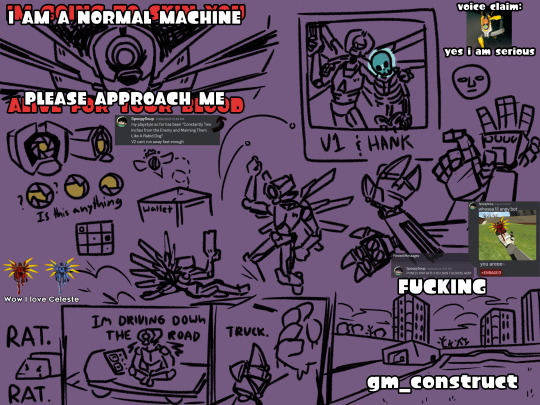
Hello Ultrakill Community
#ultrakill#v1 ultrakill#v2 ultrakill#hank ultrakill#new hyperfixation lets go#its been less than a week and im already speedrunning and racing my friends who also just got the game bc of me#also if anyone gets the 'driving down the road' reference congrats on knowing the single best half life mod#v1 does not have enough for the toll booth#the uhh 'voice claim' is bosco from deep rock and the reason why is that i think the bitcrushed growling when it attacks is funny#doodles
84 notes
·
View notes
Text










Made York 😛
(Part 21)
#tell me why my mom my MOTHER had me painting two doors#While my 19 year old brother who lives RENT FREE is about 3 feet from my door#I was literally covered in paint#ONE OF THE THINGS WASN'T EVEN PAINT IT WAS A STAINER#AND WHEN SHE REALIZED SHE WAS LIKE well you got this far might as well continue#IT TOOK HOURS#AND A BEE ATTACKED ME#😔#finally watched arcane after about a year of my friend begging so at least one good thing came out of it 🤷♂️#red vs blue#rvb#rooster teeth#rvb church#rvb tucker#rvb wash#rvb sister#rvb york#rvb felix#tweet#funny tweets
32 notes
·
View notes
Text
lol didn’t think someone giving money would give me anxiety
#to the judge that’s gonna see this case next year and the lawyer that is representing it assuming the state idk how this all works#why has the person to say the least get to go a whole year without consequence? a known criminal who after stealing from me and being#released and again getting arrest now for gang violence or some shit she was let go? she maybe associated to the group that killed that boy#last year. and here i am panicking because im afraid to carry cash. im paranoid that imma go outside and my car will be missing. i’m get#panic attacks when i drive to close to that gym and tired going back but physically cannot get out of my car and i start to cry in the#parking lot. i’m not sitting at work shaking forcing myself not to cry because someone handed me cash and i’m afraid someone is going to#steal my purse again. you think that’s not a big deal and honestly i didn’t think it was until my purse was gone. my cards stolen and used.#my key missing EVERYTHING in my purse GONE. so many things in there plus the purse i had money and all that is stuff i paid for now im out#all that cash i’m out 500$ for a key replacement i stopped feeling safe leaving my house all my non replaceable things gone and everyone#spoke to me like it was my fault and had to stand their crying while adults told me not to use a gym locker ??? but in the same breath telli#telling me this isn’t the first time she’s done this she has a warrant for her arrest she’s known to steal cars i’m the problem and there’s#nothing they can do to help me. so while i cry because all the money i had lost and never got back i had to do ALL the work to call my bank#track where my cards were being spent at call the jpay line she transferred money to look up the person she cashapped money to call the#business she was actively spending money at ask the manger if she is currently there and if they could give the police all the receipts and#video of her there for them to act like the hero’s for my brother and i tracking her down while you all belittled me#FUCK YOU AND FUCK HER i can’t be fucking normal about STUPID mundane shit i’m stuck here shaking and crying and what you tell me later it’s#not a big deal? give me all the content of your car and wallet or purse or backpack take nothing out and see what you’re left with and how m#much you need to spend to drive your car again and to tow your car home let a stranger have all your cards and address and tell me you feel#safe#OH and for the gym to tell me they know about her she used to be an employee there she doesn’t have a membership so they don’t know how she#got in and they can’t help but she did steal from another girl that night and an employee last month and who knows how many more ppl like#that’s convenient you pos sounds like she has friends that still work at the gym and open the back door for her or just let her in that’s#crazy no ? and this is all alleged because when if i lost all these things i can’t speak on what did or didn’t happen that’s some crazy bull#shit anyways the towing company felt bad for me maybe because i hadn’t stopped crying they gave me the key replacement number and told me to#mention he referred me so i could get a discount and the layman felt back for me because when i called him i started to cry and when he told#me the price i cried harder so 500$ was the cheapest but pretty much my whole check#key man*#bad** LET ME FIX TAGS#allegedly all these ppl are privileged kids from a privileged background that grew up in a sheltered community and thing there’s no#consequences to their actions because of the lack of accountability from their parents who willing pay for people to look the other way
10 notes
·
View notes
Text

#tbdeleted#got super excited to write this drabble for a sonic loredrop and then!#i'm spontaneously hit with the fear that no one actually cares#i feel so unmotivated and out of place here. i'm never “doing enough”. i'm never “fast enough”. i'm never “answering asks enough”.#this is a big reason why i immediately gave up on tom. it wasso disheartening to immediately be attacked over how i wanted to run his blog#i just wanted to have fun but what's the point when i can't do anything “right”#i keep sleeping all day because i don't want to face any of this#i'm tired of in community drama i'm tired of all the callout posts and dnis i'm tired of the vagues#i'm tired of not being good enough#i just wanted to make friends#but now it's just “this person's bad” “that person's bad” “why don't you respond fast enough” “why is your time management so bad”#i'm sorry i'm not good enough
10 notes
·
View notes
Text
There are two types of Bottoms (2023) rewatches (for me at least)

Or

#lets play a game of guess which one i am in tonight 🥹#spoiler its not the first one#isokay though im managing it well *well being a relative term for my usual amount of my panic attack management system#bottoms 2023#bottoms movie#the amount of giggly smiling tricks my brain into thinking we're actually feeling happy and in a giggly mood#and the unhingedness gives my empathetic nervous system a chance to redirect its focus onto THEIR issues instead of#mine and then suddenly my brain has realized we're not in immediate danger#and boom we've got a perfect panic disorder management strategy for me#the other type of rewatch is also very fun. trust. Especially when I'm introducing it to my other sapphic friends. so much glee#and unintelligible thoughts. giggly unintelligible thoughts#anyhoo here you all go :))
48 notes
·
View notes